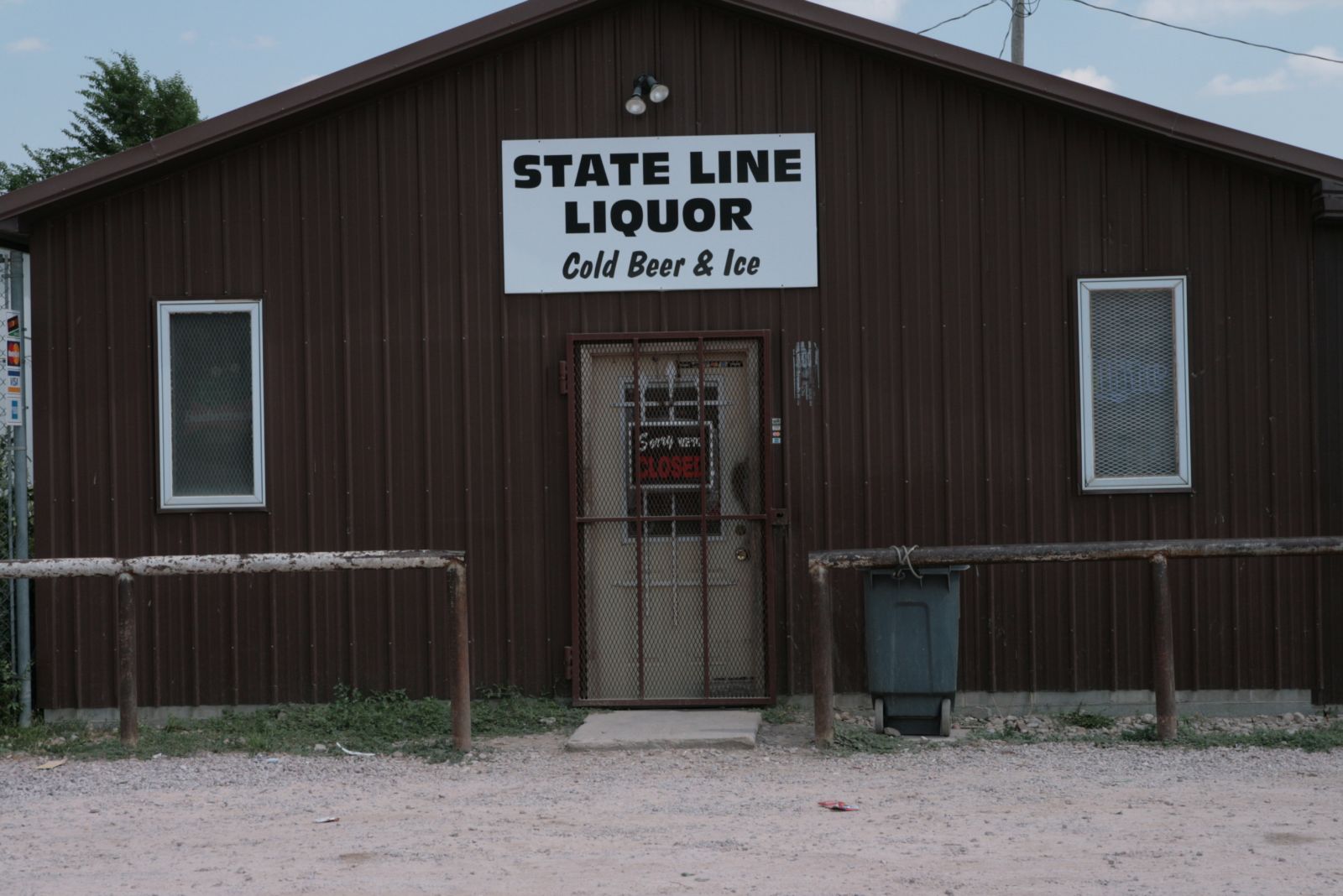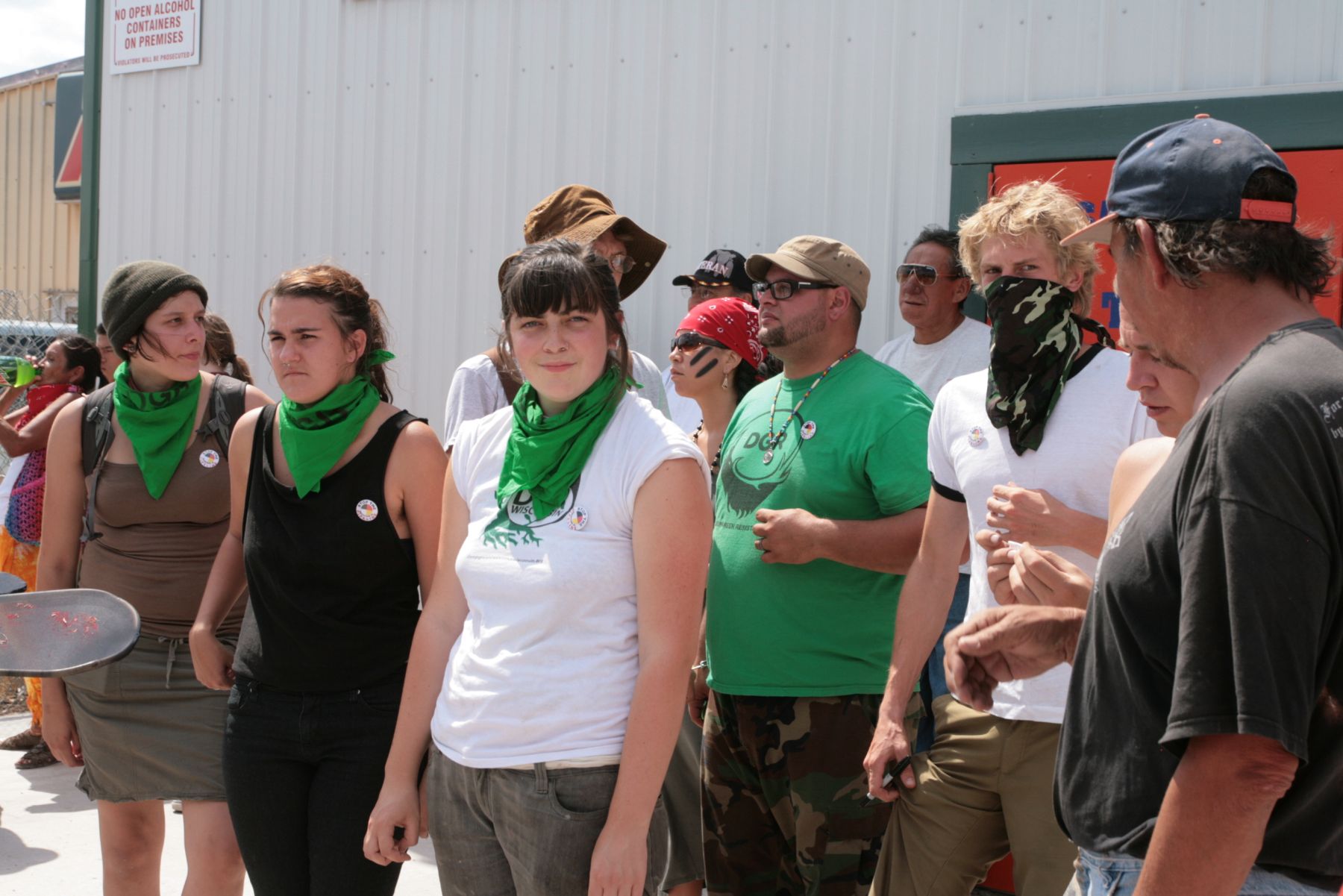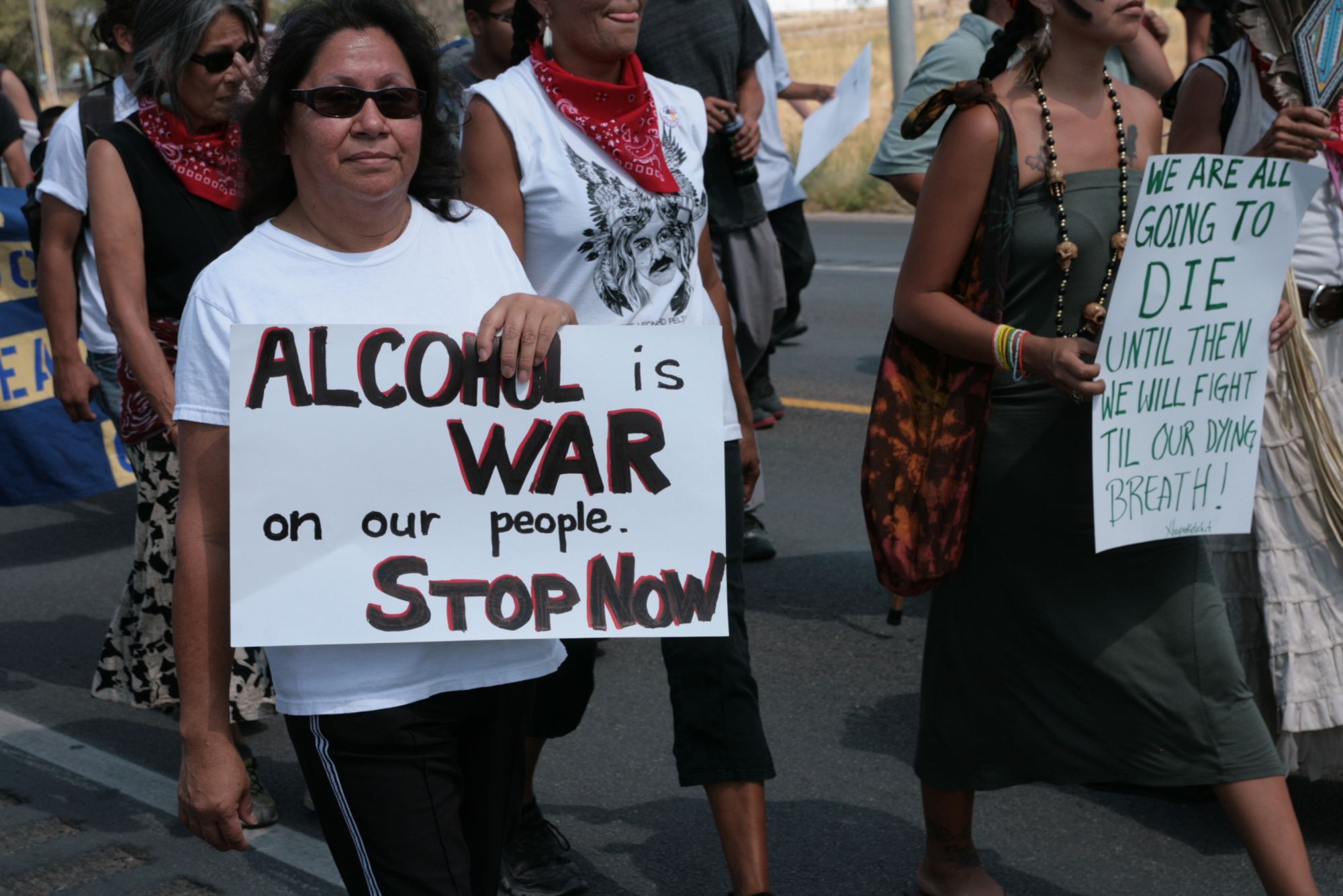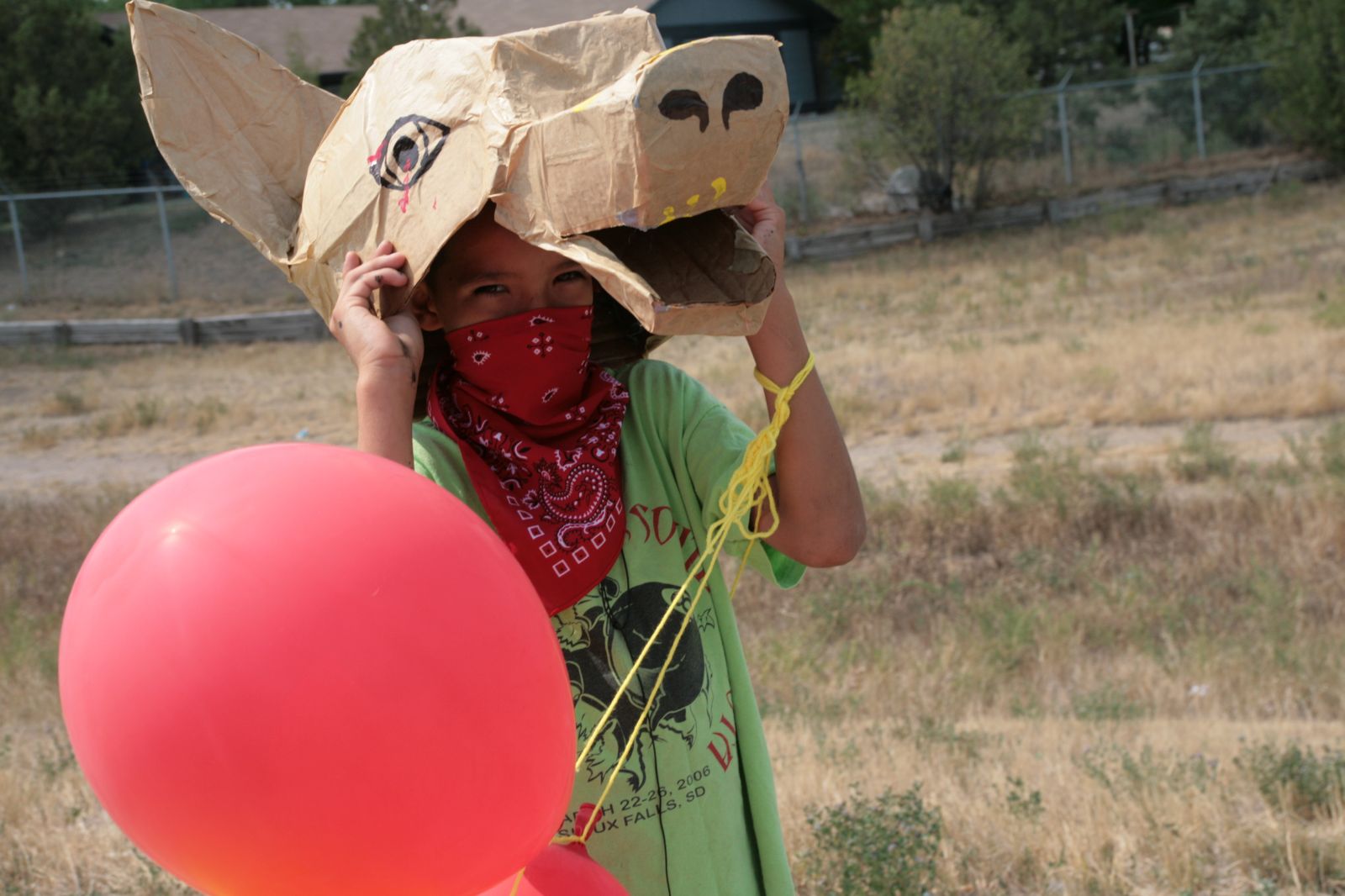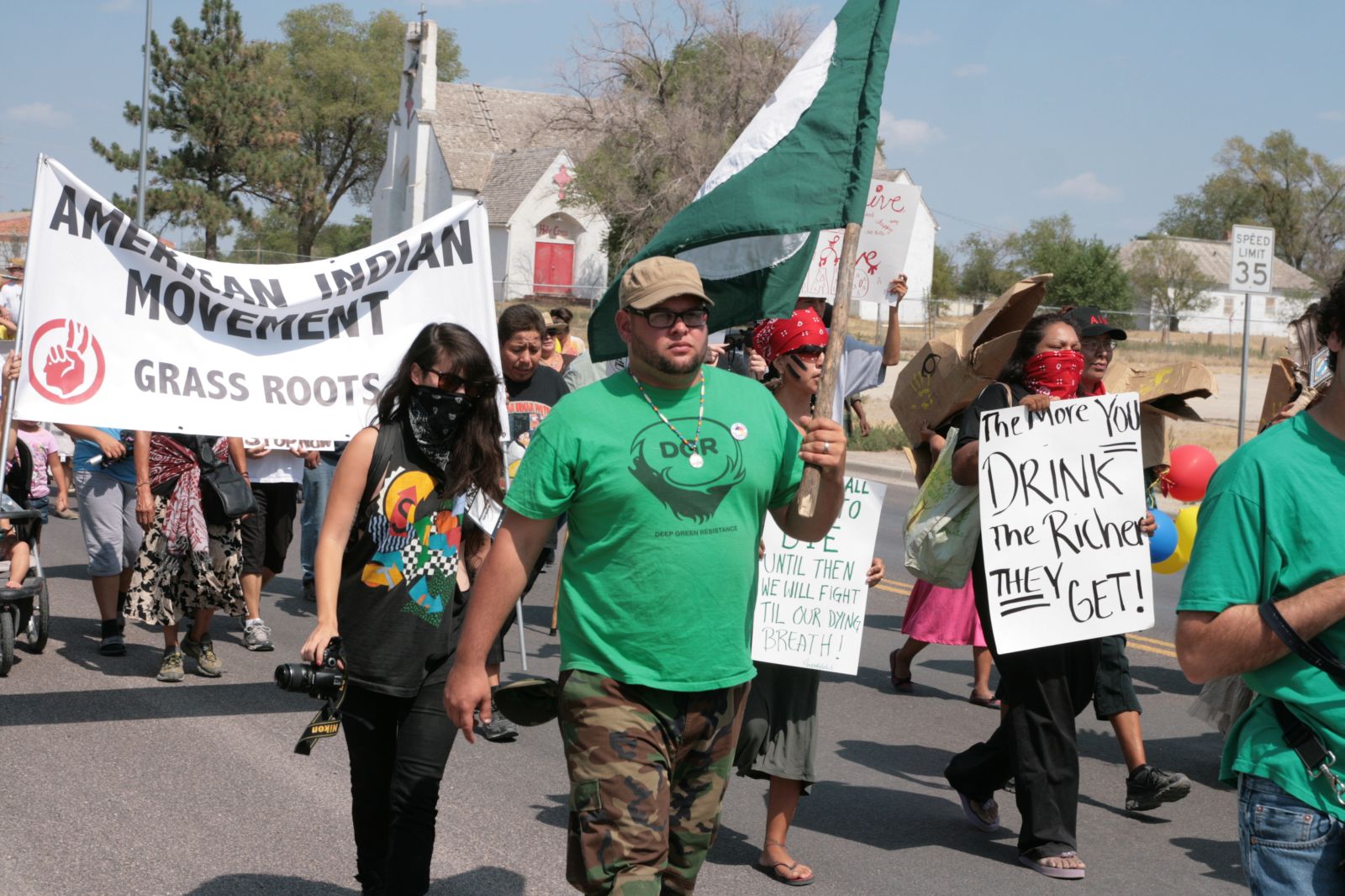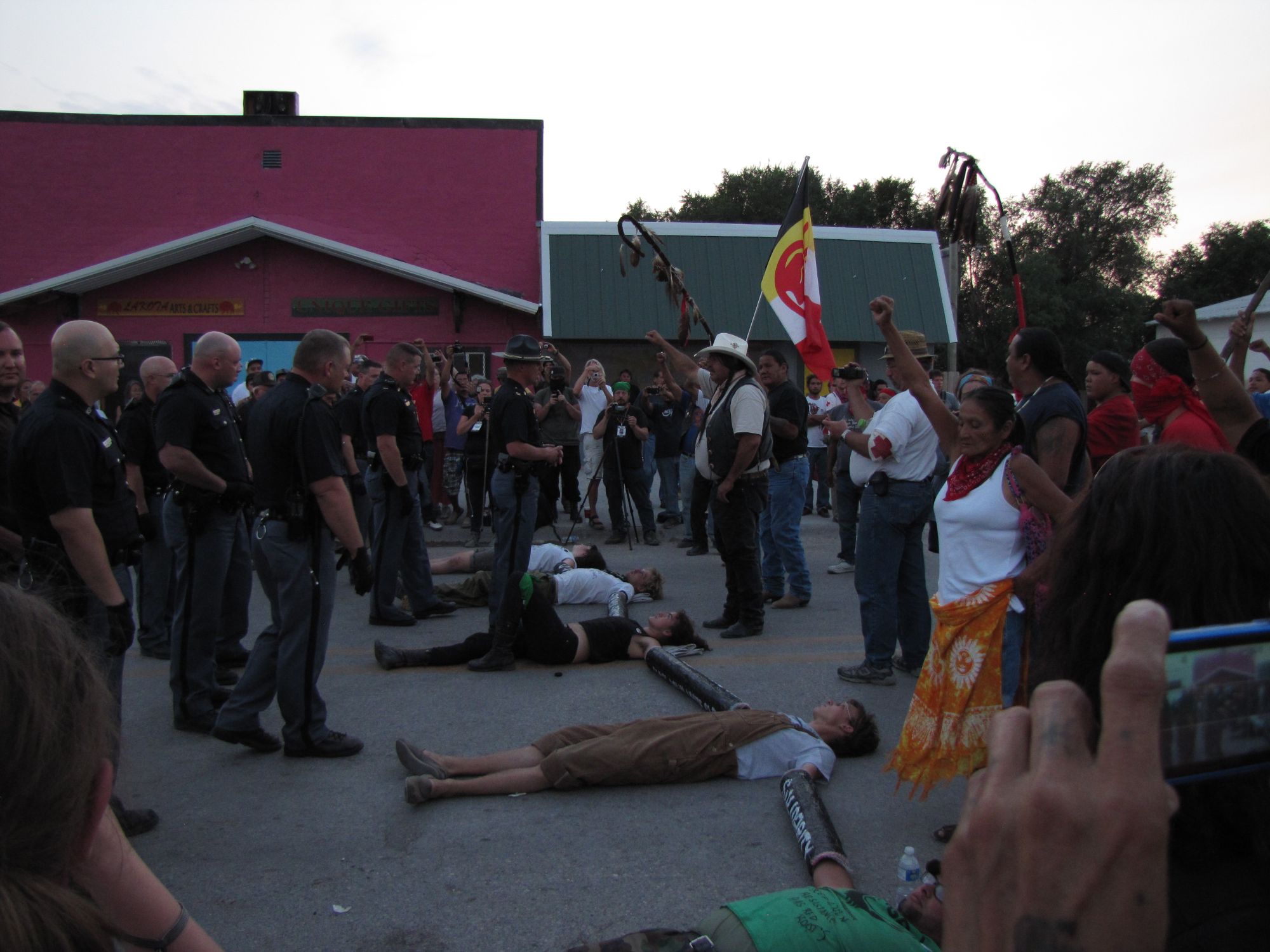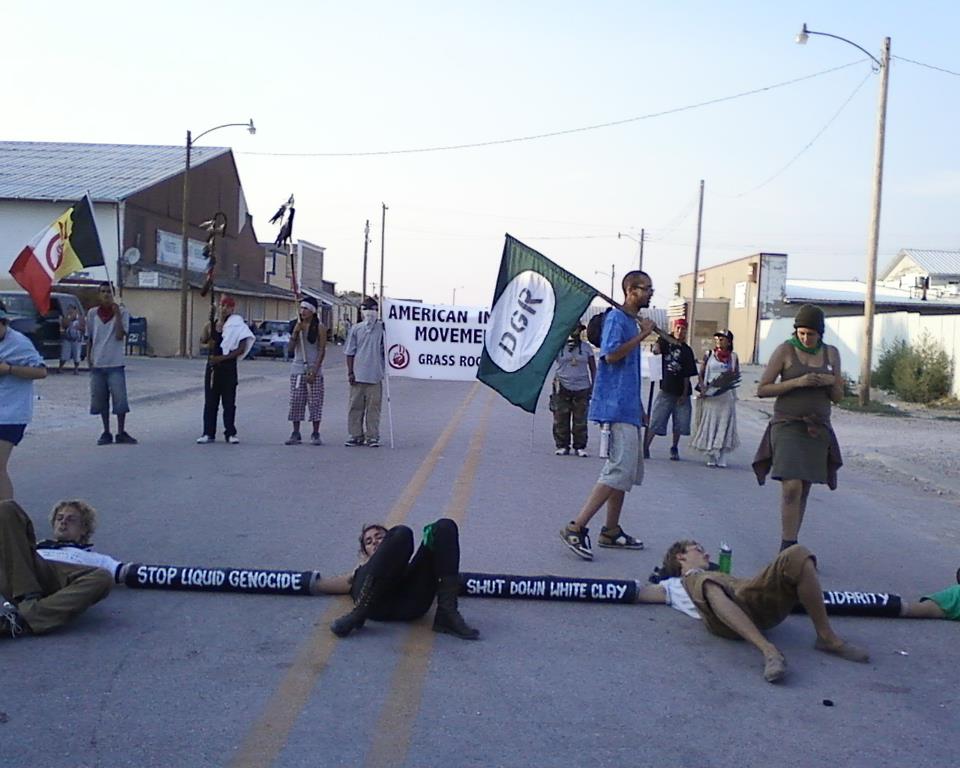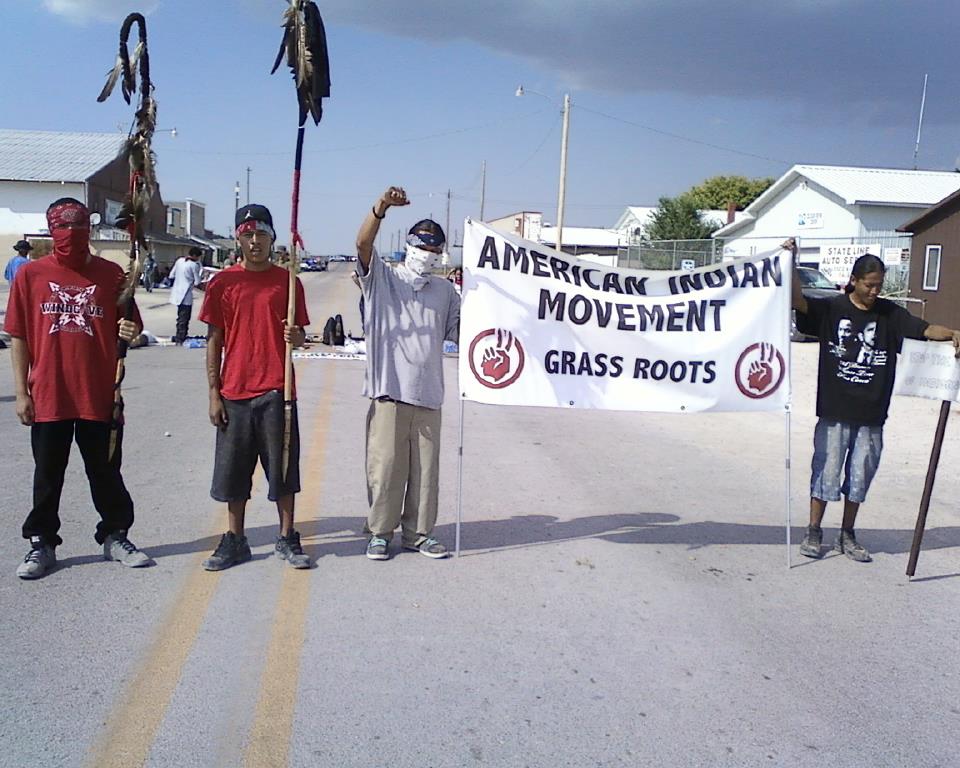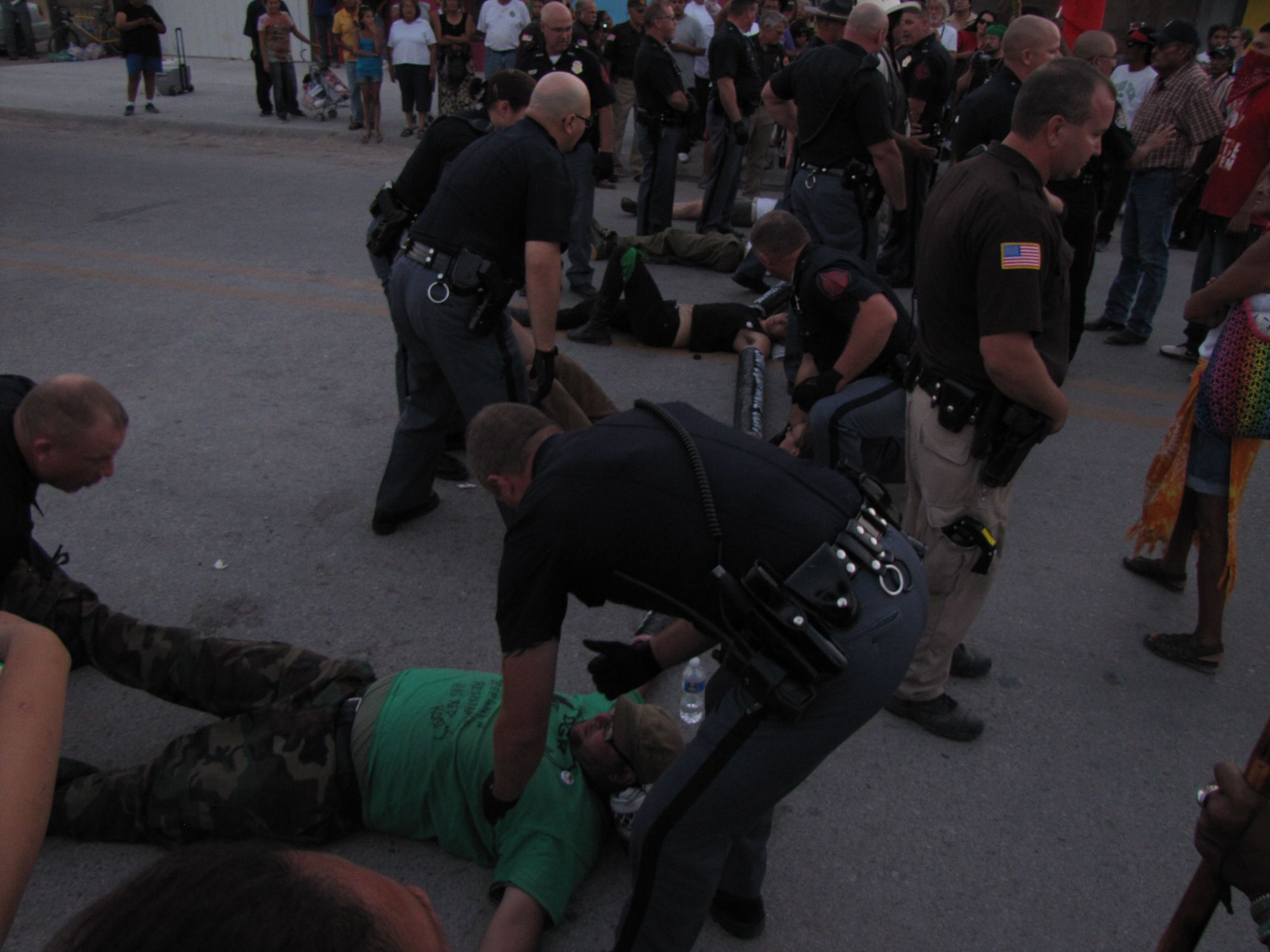by Deep Green Resistance News Service | Jul 26, 2013 | Human Supremacy, Male Supremacy, White Supremacy
By Kourtney Mitchell / Deep Green Resistance
Over the almost seven years I have been involved in social justice activism of various kinds, my level of understanding concerning our social and planetary predicament has grown quite a bit. I began my process towards a radical perspective as a student activist in the university anti-violence against women movement. It was there I developed what I like to call a clear “scope of the problem.
Allow me to back up a bit. I did not know it at the time, but while I was in high school my family survived a rough experience fighting the local police department that helped prime me for radical activism. My mother, while an officer, filed a civil suit against the department for racial discrimination. The ordeal was traumatizing – the media was relentless in their assaults on her character, the department engaged in continuous harassment of my family (including forcibly evicting us from our home on my 16th birthday), all of this culminating in several relocations in- and out-of-state. If it were not for the consistent support of family, friends, legal counsel and a compassionate and talented journalist who had our back, the city and its armed thugs would have certainly continued its oppression against us. Instead, my mother’s case was a primary reason the city organized a citizen’s review board to oversee law enforcement activities. My mother and I went on to write and publish a creative nonfiction book of her experience.
To this day, I am consistently amazed at my mother’s strength and courage. I witnessed her defy all odds, determined to stand up to the city’s bullying and set a lasting precedent for future generations.
As a teen I was not inclined towards activism, but that all changed when I attended college and somehow found myself sitting in the social justice center talking pro-feminist theory with fellow campus community members. I completed feminist and anti-violence training and that is when the real change began.
The information I learned was harrowing. I had no idea just how prevalent male violence against women was. Shaken to the core, I spent several nights in tears, struggling to understand just how the world became this way and how it could possibly continue. From the first night of training, I knew pro-feminism would be my life’s work. It became my passion.
Further social justice training on issues of race and class began to complete the circle for me. My own life experiences started to make much more sense, and I became sensitive to issues of justice and equality.
Then it was time for another wake-up call. I do not remember exactly how I discovered radical politics, but eventually I came upon Marxist theory, which then lead me to anarchism and eventually anti-civilization. I began reading Derrick Jensen’s Endgame in the fall of 2008, and all of the emotions I felt when completing activist training came rushing back to the fore.
It was all even worse than I had thought – the levels of violence against women, people of color, indigenous communities, children and now the planet. We are, in the words of Lierre Keith, “turning the planet to dust” with agricultural and extractive industrial processes. Quite literally, the planet is being killed, and that murder is increasing over time.
And that is when it all finally clicked, once and for all. It took me nearly three years to finally complete Endgame. Jensen does not hold back – his writing makes the violence of this culture so palpable. In addition to pro-feminism, I decided to somehow find a way to assist in the fight against industrial civilization, just in time for the publication of Deep Green Resistance: Strategy to Save the Planet.
A good definition of “scope” is “extent or range of view.” It is how far or wide one is able to see, how much of a given subject, problem or circumstance one has considered. A narrow scope yields superficial or inadequate results in addressing a given situation. A wide scope allows one to consider more possibilities, and be more honest about what needs to be done.
My life experiences have given me no choice but to keep a wide scope of our planet’s peril. I have been fortunate – and unfortunate – enough to have, directly or indirectly, experienced many of this culture’s truly wicked crimes against humanity.
An aspect of widening your scope that is important to consider is that when you do, it is likely you will never be the same. Society will transform before your eyes – what was once a world seemingly full of pleasure and privilege becomes one in which oppression, repression and psychopathic behavior are the norm, the way the system works.
But when you do widen your scope, and finally become honest about what is happening, you have a responsibility to act. And you must allow the reality of the situation to inform your actions.
Jensen, Ward Churchill, Peter Gelderloos, Arundhati Roy, Stephanie McMillan, and so many others have all articulated it in various ways – the dominant culture will not voluntarily transition to a more sustainable way of life unless we force them. Even if it were possible, it is unlikely to occur within a timeframe adequate enough to save the planet from destruction.
Consider this: there is a chance that this planet is the only source of life of its kind in the entire universe. Whatever your belief, this is a possibility, and industrial civilization is destroying potentially the only source of life.
One would be hard-pressed to find a greater evil than that. If you ever wanted to determine a set of objective moral truths to follow and carve them onto a couple stone tablets, this is a good start: destroying all life on earth is evil and immoral and it must be prevented by whatever means necessary.
We are facing a global temperature increase between five and eleven degrees Celsius by the end of the century. Keep in mind that just a few degrees increase is more than enough to wipe out the vast majority of diverse species on the planet.
Last year, 313 black men were killed by police or other vigilantes, an average of one every 28 hours.
Men battering women is the most common crime in the world; a man beats a woman once every fifteen seconds. And at least one-third of all women will be sexually assaulted in their lifetime.
We must begin to see the world through the lens of justice, and our scope must extend to all of life. There are some very serious yet important questions that need to be answered, and very soon: What do we value – life or luxury? If the dominant culture is incapable of changing on its own, are we prepared to force it to change? And what will it take to do so?
There is no use in hiding behind our privileges, comforts and perceived inadequacies any longer. Oppressed communities have been on the front lines fighting back against genocide of mind and body since the onset of this culture, but now everyone and everything is at risk. Even the privileged elite – sadistic in their callous disregard for the welfare of others, stopping at nothing to extract every ounce of resources from whoever they can – will have to pay for their actions. And that payment will be made in blood.
So what scope are you using? Are you waiting for a mass shift in collective consciousness, ascension into a higher spiritual plane of existence? If so, please tell me: who all is included in this ascension? Will the psychopaths destroying the planet be going as well? Seriously, you can have them. Take them with you. I love this beautiful planet and I’m staying here to fight for it.
Get serious about the situation we are in. Take a step back, look at the world for what it really is, swallow that lump in your throat, and join us. Let the emotions wash over you – allow yourself to fully feel them. Get acquainted with that despair and heartbreak, and then do what is necessary to make sure future generations do not also have to feel it.
Everything we do needs to be done mindful of its effect on several generations ahead. This culture is so short-sighted; in less than one percent of our existence on this planet, we’ve decimated land, animal, water and air. There is a hole in the ozone layer, and acid in the rain, and the very soil upon which we depend is either blowing away in the wind or running off into the seas and oceans.
Such is the result of limiting our scope to the next quarter, or the next fiscal year. It is a suicidal tendency. Let’s rediscover our sanity. Communion with each other, with Earth, and with its entire community of life – this reconnection will help us reverse this murderous trajectory. We don’t have much choice, anyway. So widen your scope and fight.
We have a planet to save.
Let’s Get Free! is a monthly column by Kourtney Mitchell, a writer and activist from Georgia, primarily focusing on anti-oppression and building genuine alliance with oppressed communities. Contact him at kourtney.mitchell@gmail.com.
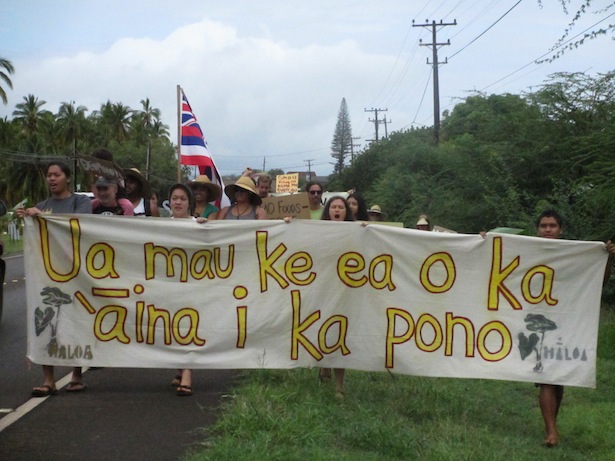
by Deep Green Resistance News Service | Apr 11, 2013 | Agriculture, Building Alternatives, Colonialism & Conquest, Indigenous Autonomy, Protests & Symbolic Acts
By Imani Altemus-Williams / Waging Nonviolence
At 9 am on an overcast morning in paradise, hundreds of protesters gathered in traditional Hawaiian chant and prayer. Upon hearing the sound of the conch shell, known here as Pū, the protesters followed a group of women towards Monsanto’s grounds.
“A’ole GMO,” cried the mothers as they marched alongside Monsanto’s cornfields, located only feet from their homes on Molokai, one of the smallest of Hawaii’s main islands. In a tiny, tropical corner of the Pacific that has warded off tourism and development, Monsanto’s fields are one of only a few corporate entities that separates the bare terrain of the mountains and oceans.
This spirited march was the last of a series of protests on the five Hawaiian islands that Monsanto and other biotech companies have turned into the world’s ground zero for chemical testing and food engineering. Hawai’i is currently at the epicenter of the debate over genetically modified organisms, generally shortened to GMOs. Because Hawai’i is geographically isolated from the broader public, it is an ideal location for conducting chemical experiments. The island chain’s climate and abundant natural resources have lured five of the world’s largest biotech chemical corporations: Monsanto, Syngenta, Dow AgroSciences, DuPont Pioneer and BASF. In the past 20 years, these chemical companies have performed over 5,000 open-field-test experiments of pesticide-resistant crops on an estimated 40,000 to 60,000 acres of Hawaiian land without any disclosure, making the place and its people a guinea pig for biotech engineering.
The presence of these corporations has propelled one of the largest movement mobilizations in Hawai’i in decades. Similar to the environmental and land sovereignty protests in Canada and the continental United States, the movement is influenced by indigenous culture.
“All of the resources that our kapuna [elders] gave to us, we need to take care of now for the next generation,” said Walter Ritte, a Hawai’i activist, speaking in part in the Hawaiian indigenous language.
“That is our kuleana [responsibility]. That is everybody’s kuleana.”
In Hawaiian indigenous culture, the very idea of GMOs is effectively sacrilegious.
“For Hawaii’s indigenous peoples, the concepts underlying genetic manipulation of life forms are offensive and contrary to the cultural values of aloha ‘ʻāina [love for the land],” wrote Mililani B. Trask, a native Hawaiian attorney.
Deadly practices
Monsanto has a long history of making chemicals that bring about devastation. The company participated in the Manhattan Project to help produce the atomic bomb during World War II. It developed the herbicide “Agent Orange” used by U.S. military forces during the Vietnam War, which caused an estimated half-million birth deformities. Most recently, Monsanto has driven thousands of farmers in India to take their own lives, often by drinking chemical insecticide, after the high cost of the company’s seeds forced them into unpayable debt.
The impacts of chemical testing and GMOs are immediate — and, in the long-term, could prove deadly. In Hawaii, Monsanto and other biotech corporations have sprayed over 70 different chemicals during field tests of genetically engineered crops, more chemical testing than in any other place in the world. Human studies have not been conducted on GMO foods, but animal experiments show that genetically modified foods lead to pre-cancerous cell growth, infertility, and severe damage to the kidneys, liver and large intestines. Additionally, the health risks of chemical herbicides sprayed onto GMO crops cause hormone disruption, cancer, neurological disorders and birth defects. In Hawaii, some open-field testing sites are near homes and schools. Prematurity, adult on-set diabetes and cancer rates have significantly increased in Hawai’i in the last ten years. Many residents fear chemical drift is poisoning them.
Monsanto’s agricultural procedures also enable the practice of monocropping, which contributes to environmental degradation, especially on an island like Hawai’i. Monocropping is an agricultural practice where one crop is repeatedly planted in the same spot, a system that strips the soil of its nutrients and drives farmers to use a herbicide called Roundup, which is linked to infertility. Farmers are also forced to use pesticides and fertilizers that cause climate change and reef damage, and that decrease the biodiversity of Hawai’i.
Food sovereignty as resistance
At the first of the series of marches against GMOs, organizers planted coconut trees in Haleiwa, a community on the north shore of Oahu Island. In the movement, protesting and acting as caretakers of the land are no longer viewed as separate actions, particularly in a region where Monsanto is leasing more than 1,000 acres of prime agricultural soil.
During the march, people chanted and held signs declaring, “Aloha ‘āina: De-occupy Hawai’i.”
The phrase aloha ‘āina is regularly seen and heard at anti-GMO protests. Today the words are defined as “love of the land,” but the phrase has also signified “love for the country.” Historically, it was commonly used by individuals and groups fighting for the restoration of the independent Hawaiian nation, and it is now frequently deployed at anti-GMO protests when people speak of Hawaiian sovereignty and independence.
After the protest, marchers gathered in Haleiwa Beach Park, where they performed speeches, music, spoken-word poetry and dance while sharing free locally grown food. The strategy of connecting with the land was also a feature of the subsequent protest on the Big Island, where people planted taro before the march, and also at the state capitol rally, where hundreds participated in the traditional process of pounding taro to make poi, a Polynesian staple food.
The import economy is a new reality for Hawaii, one directly tied to the imposition of modern food practices on the island. Ancient Hawai’i operated within the Ahupua’a system, a communal model of distributing land and work, which allowed the islands to be entirely self-sufficient.
“Private land ownership was unknown, and public, common use of the ahupua’a resources demanded that boundaries be drawn to include sufficient land for residence and cultivation, freshwater sources, shoreline and open ocean access,” explained Carol Silva, an historian and Hawaiian language professor.
Inspired by the Ahupua’a model, the food sovereignty movement is building an organic local system that fosters the connections between communities and their food — a way of resisting GMOs while simultaneously creating alternatives.
Colonial history
The decline of the Ahupua’a system didn’t only set Hawai’i on the path away from food sovereignty; it also destroyed the political independence of the now-U.S. state. And indeed, when protesters chant “aloha ‘āina” at anti-GMO marches, they are alluding to the fact that this fight isn’t only over competing visions of land use and food creation. It’s also a battle for the islands’ political sovereignty.
Historically, foreign corporate interests have repeatedly taken control of Hawai’i — and have exploited and mistreated the land and its people in the process.
“It’s a systemic problem and the GMO issue just happens to be at the forefront of public debate at the moment,” said Keoni Lee of ʻŌiwi TV. “ʻĀina [land] equals that which provides. Provides for who?”
The presence of Monsanto and the other chemical corporations is eerily reminiscent of the business interests that led to the overthrow of the Hawaiian Kingdom. Throughout the 19th century, the Hawaiian Kingdom was recognized as an independent nation. That reality changed in 1893, when a group of American businessmen and sugar planters orchestrated a U.S. Marine’s armed coup d’etat of the Hawaiian Kingdom government.
Five years later, the U.S. apprehended the islands for strategic military use during the Spanish-American War despite local resistance. Even then-President Grover Cleveland called the overthrow a “substantial wrong” and vowed to restore the Hawaiian kingdom. But the economic interests overpowered the political will, and Hawai’i remained a U.S. colony for the following 60 years.
The annexation of Hawai’i profited five sugarcane-manufacturing companies commonly referred to as the Big Five: Alexander & Baldwin, Amfac (American Factors), Castle & Cooke, C. Brewer, and Theo H. Davies. Most of the founders of these companies were missionaries who were actively involved in lobbying for the annexation of the Hawaiian islands in 1898. After the takeover, the Big Five manipulated great political power and influence in what was then considered the “Territory of Hawaii,” gaining unparalleled control of banking, shipping and importing on the island chain. The companies only sponsored white republicans in government, creating an oligarchy that threatened the labor force if it voted against their interests. The companies’ environmental practices, meanwhile, caused air and water pollution and altered the biodiversity of the land.
The current presence of the five-biotech chemical corporations in Hawai’i mirrors the political and economic colonialism of the Big Five in the early 20th century — particularly because Monsanto has become the largest employer on Molokai.
“There is no difference between the “Big Five” that actually ruled Hawai’i in the past,” said Walter Ritte. “Now it’s another “Big Five,” and they’re all chemical companies. So it’s almost like this is the same thing. It’s like déjàvu.”
Rising up
At the opening of this year’s legislative session on January 16, hundreds of farmers, students and residents marched to the state capitol for a rally titled “Idle No More: We the People.” There, agricultural specialist and food sovereignty activist Vandana Shiva, who traveled from India to Hawai’i for the event, addressed the crowd.
“I see Hawai’i not as a place where I come and people say, ‘Monsanto is the biggest employer,’ but people say, ‘this land, its biodiversity, our cultural heritage is our biggest employer,’” she said.
As she alluded to, a major obstacle facing the anti-GMO movement is the perception that the chemical corporations provide jobs that otherwise might not exist — an economic specter that the sugarcane companies also wielded to their advantage. Anti-GMO organizers are aware of how entrenched this power is.
“The things that we’re standing up against are really at the core of capitalism,” proclaimed Hawaiian rights activist Andre Perez at the rally.
Given the enormity of the enemy, anti-GMO activists are attacking the issue from a variety of fronts, including organizing mass education, advocating for non-GMO food sovereignty and pushing for legislative protections. Organizers see education, in particular, as the critical element to win this battle.
“Hawai’i has the cheapest form of democracy,” said Daniel Anthony, a young local activist and founder of a traditional poi business. “Here we can educate a million people, and Monsanto is out.”
Others are using art to educate the public, such as Hawaiian rapper Hood Prince, who rails against Monsanto in his song “Say No to GMO.” This movement is also educating the community through teach-ins and the free distribution of the newly released book Facing Hawaii’s Future: Essential Information about GMOs.
Hawai’i has already succeeded in protecting its traditional food from genetic engineering. Similar to the way the Big Five controlled varying sectors of society, the biotech engineering companies are financially linked to the local government, schools and university. Monsanto partially funds the College of Tropical Agriculture and Human Resources at the University of Hawaii. The university and the Hawaii Agriculture Research Center began the process of genetically engineering taro in 2003 after the university patented three of its varieties. Once this information became widely known, it incited uproar of objection from the Hawaiian community. Taro holds spiritual significance in the islands’ indigenous culture, in which it is honored as the first Hawaiian ancestor in the creation story.
“It felt like we were being violated by the scientific community,” wrote Ritte in Facing Hawaii’s Future. “For the Hawaiian community, taro is not just a plant. It’s a family member. It’s our common ancestor ‘Haloa …. They weren’t satisfied with just taking our land; now they wanted to take our mana, our spirit too.”
The public outcry eventually drove the university to drop its patents.
Anti-GMO activists are hoping for further successes in stopping genetic food engineering. In the current legislative session, there are about a dozen proposed bills pushing GMO regulation, labeling and a ban on all imported GMO produce. These fights over mandating GMO labeling and regulation in Hawai’i may seem like a remote issue, but what happens on these isolated islands is pivotal for land sovereignty movements across the globe.
“These five major chemical companies chose us to be their center,” said Ritte. “So whatever we do is going to impact everybody in the world.”
From Waging Nonviolence: http://wagingnonviolence.org/feature/the-struggle-to-reclaim-paradise/

by Deep Green Resistance News Service | Apr 1, 2013 | Movement Building & Support, Strategy & Analysis
By Ben Barker / Deep Green Resistance Wisconsin
Do you believe in a better world? Do you believe in one without the torture of poverty and slavery; without hierarchies based on dominance; without a dying planet? If you do believe in this world, what are you willing to do to help bring it about?
I know many who yearn for justice, but far fewer with any kind of plan for achieving it. There’s no lack of morality in this equation, just of strategy and, perhaps, courage.
Every movement for social change has understood that when a system of law is corrupt, we must turn instead to the laws of the universe: human rights, the living land, justice. These movements are always deemed radical—and that’s because they are. Hope and prayers do not alone work to change the world. We’re going to have to fight for it.
All your heroes of the past knew this. Those who won civil rights knew it. Those who won women’s suffrage knew it. Those who abolished slavery knew it. Those who freed India from colonial rule knew it.
Martin Luther King, Jr. clearly understood this. He said, “Freedom is never given to anybody, for the oppressor has you in domination because he plans to keep you there, and he never voluntarily gives it up. And that is where the strong resistance comes. We’ve got to keep on keeping on, in order to gain freedom. It is not done voluntarily, but it is done through the pressure that comes about from people who are oppressed. Privileged classes never give up their privileges without strong resistance.”
All movements striking at the roots of social problems were—and still are—radical by default.
There’s no shortage of issues that need tackling today. Pick your favorite atrocity: dying oceans, species extinction, deforestation, climate chaos, pollution, violence against women, militarism, white supremacy, poverty, colonialism, homophobia, slavery, government corruption. The hard reality is that the world and all that makes life worth living is under attack—and we’re losing the battle. Everything keeps getting worse and our standards for success keep getting lowered. Never has there been a more critical time for those who want a better world to rise and make it happen. So what’s stopping us?
Of course there are vast and powerful entities wholly invested in and mercilessly guarding the way things are. This is an old story; we’re Margaret Mead’s small group of thoughtful, committed citizens taking on a giant. But in reality, we’re not even there yet. No, we’re still struggling to find unity amongst ourselves, to gather the people necessary to begin making any change at all.
It’s long past time to be forthright about what divides us as activists. Most all of us want to see the same outcome—a living planet, flourishing human communities—but we stumble on how to get there. Sure, some things we just won’t agree on, and that’s perfectly fine. But with the stakes so high, are we willing to forfeit all possibility of effectiveness because we can’t find a way to get along?
Let’s talk about our differences so we can better find our common ground. Writer Lierre Keith has investigated the history of social movements and emerged with much of the work done for us. She suggests there are two major currents amongst activists: liberals and radicals. This is not a dichotomy: like reform and revolution, both liberals and radicals have been necessary and complimentary to each other. The key is balance and respect for various approaches to the same problems.
The first difference between radicals and liberals is how we view individuals. Radicals see society as made of groups or classes; individual people share common clause based on shared circumstances and goals. Liberals, on the other hand, see individuals as just that; each person is distinct from another. The “working class”, for example, was a radical concept which liberals have largely removed from their discourse.
Next is how social change happens. Liberals lend their energy to ideals and attitudes, certain that change will come one heart and mind at a time. Institutions are the targets of radicals, though, with old corrupt ones sought to be dismantled and replaced with just, sustainable, new ones. If Martin Luther King, Jr. and the civil rights movement would have focused solely on convincing whites that blacks aren’t inferior, they would have been taking the liberal route. If they would have focused solely on defeating racist laws, they would have been taking the radical route. History suggests that it was both that got the job done.
A final difference centers on justice and what we think it looks like. Radicals tend to measure justice by long-term material conditions—a lack of oppression and destruction in everyday life, now and forever. Morality is predetermined for the liberals, with the law or broader society acting as judge. Any win in the realm of free speech, for example, might look like a step in the right direction to the liberal perspective, whereas radicals might be more concerned with eliminating hate speech (and groups), whether or not it is legally permissible.
Despite the distinctions, effective activism hinges on understanding power and how it works. Wherever we may fall on the spectrum, we must keep our eyes on power: who has it, how it’s being used, and how it can be transferred from the hands of the powerful to the hands of the powerless. There is no way to talk about social change without talking about power.
Again, all throughout history liberals and radicals have employed complimentary strategies to make tangible differences in the world. We may feel uncomfortable working with each other, but it’s either that or an increasingly ruined world. The ethical choice should be clear.
What liberals need to understand is that any efforts challenging systems of power are and will be seen as radical. There’s just no way around it and forging distance from radical counterparts is not only useless, but a betrayal of freedom-fighters before us. We need to remember that Rosa Parks’ hero was Malcolm X. We need to remember that Gandhi was successful because he was easier to negotiate with than Bhagat Singh’s militants. Neutrality is complicity and it’s time to take sides: one hand is the small group of capitalist monsters profiting off of misery and on the other is anyone willing to resist injustice.
Recently, I had a conversation with a member of the Democratic Party which highlights how far from solidarity many liberals have strayed. Upon meeting, he asked what I did. “I’m a writer,” I said. About what, he wondered? “Radical social change,” I told him. And the next fifteen minutes, up until the point I politely left, saw him adamantly discouraging me from using such a confrontational and extremist term as “radical.” My claims that this desperate time calls for radical responses fell on deaf ears, because how desperate can anything be with a Democrat in the White House? In hindsight, I wish I would’ve reminded him just how radical the movements have been that are now allowing for black, female, and homosexual candidates from his Party to get in office.
What radicals need to understand is that what is most militant is not always what is right, both in terms of strategy and morality. And sometimes it is. Power only changes by force, but force can take many different forms. Suffragists lobbied and campaigned for women to get the vote, but when that wasn’t working, they added sabotage to their arsenal. Simultaneously used, their tactics proved part of an ultimately successful strategy. Both approaches were radical because they applied force, but they were employed in very specific times and contexts. Strategy allows us to choose between tactics with a lens of pragmatism rather than by whim of emotion. Whatever actions are taken, they must be well thought out and conducted with discipline.
Too many radicals today fall into the trap of black-and-white thinking. They see bad institutions and therefore all institutions are bad. They see useless reforms and therefore all reforms are useless. They see poor leadership, and therefore no leadership is better.
Radical or liberal, we really need it all. We need the community organizers, the gardeners, the healers, the warriors, and the artists. Most of all, we need to each other’s work as necessary pieces of the larger struggle.
Regardless of our route, activists need to always remember the world we’re working towards. Solutions will come only after we honestly name the problems. This means we cannot look away from the severity of the situation, even if it doesn’t make us feel good. Social change is about social change and not about any individual’s emotional state. Suffering is real and it beckons us to fashion adequate responses.
Changing the world means naming the one we’re presently stuck with. It’s time to say this out loud: the problems we face are systemic, not random; they are symptoms of a social and economic arrangement of power. I call that arrangement industrial capitalism. You may call it what you like. What’s important is that we all understand that there is no future in the way things are.
Liberals, radicals, and anyone working towards a more just and sustainable world cannot continue to spend so much time condemning each other’s approaches. There’s a name for this destructive tendency: horizontal hostility. And unless we want to in-fight to the end of the world, it has to stop.
Success will be the forging of a culture of resistance strong and vibrant enough to take apart this society and build a new one. This means vast networks of communities of people supporting each other’s efforts towards a common goal. It means the artists support the warriors who support the healers who support the gardeners who support the community organizers who support the warriors. Not all in a culture of resistance need agree on everything; we just need to pledge that we won’t turn on our own in the heat of the struggle.
For every year, every day, and every moment we don’t act strategically and decisively, another person of color is terrorized by white police officers, another woman is violated by men, another indigenous culture is stamped out, another species is added to the extinction list, the health of human community and the entire planet accelerates in decline.
Those with fire and love in their hearts, those who live by moral obligation, know that the time to act is now. So the question becomes: will you join us in finally and totally changing this world. Is your privilege and comfort more important than justice, or will you join us? Are your ideals more important than the hard truth, or will you join us?
If you want a better world, what are you waiting for? Find your allies, work out your differences, and get down to business.
Beautiful Justice is a monthly column by Ben Barker, a writer and community organizer from West Bend, Wisconsin. Ben is a member of Deep Green Resistance and is currently writing a book about toxic qualities of radical subcultures and the need to build a vibrant culture of resistance.
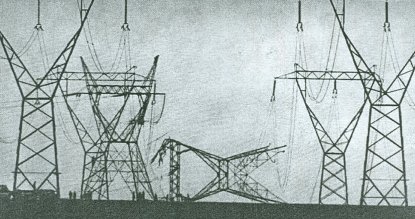
by Deep Green Resistance News Service | Mar 6, 2013 | Direct Action, Human Supremacy, Strategy & Analysis
Environmentalists today have our work cut out for us. Caught between the urgency of the ecological crises and reactionary capitalist forces that continue to push (quite successfully) for ever more outrageous and egregious destruction, finding an effective and timely path forward is no easy task. There are a wide variety of strategies for change vying for our attention, broadcast to us by a diversity of folks with a diversity of motivations—some of which are mixed, others confused, and more that are dangerous. By and large, the strategies we’ve adopted for our movements go unchallenged and unquestioned.
But given where we find ourselves—in the middle of an irredeemably exploitative and cruel society fundamentally dependent on fossil fuels—and what we’ve been able to accomplish so far in the fifty-some years of the environmental movement, it’s time to stop a moment and reflect.
What we’ve tried so far—everything from alternative consumer choices, lobbying, and symbolic protests to education, and localized permaculture lifeboats—has proven incapable of addressing the scale and severity of the crises at hand and ineffective in forcing change. While these tactics can be used to achieve certain goals, and certainly have their place within a serious movement for justice and sustainability, they will never be enough to accomplish what we must in the end.
So with that in mind, the time has come to have serious conversations and ask ourselves serious questions. What do we want to achieve, and how can we best achieve it?
Do we want to perpetuate a way of life that affords some of us with incredible material prosperity? Are we merely looking for new ways to sustain the unsustainable? Or do we want first and foremost to stop the destruction and exploitation of the living world, and are we prepared to adjust our society—our way of life—to what that requires of us? Are we prepared to see and name that destruction for what it is,industrial civilization, and do what’s necessary to bring a halt to it?
If so, are we willing to face what’s necessary to be successful? Are we willing to work for that goal by any means necessary, including sabotage and property destruction? Will we support those who do? For if the ends don’t justify the means, what does?
Are we willing to set the health of Earth as the ultimate metric by which we will be judged? As many others have said, those who come after us will not be swayed or moved by how deeply we ached at the world dying around us. They won’t forgive us no matter how big our marches and rallies were, nor how clever our slogans and chants. The precise harmony and abundance of our permaculture gardens will be irrelevant to them if the forests, rivers, and fish are gone. The spiritual fulfillment and inner peace we’ve found we be meaningless and resented if all the mountains have been ripped inside out, the air and water filled with poisons.
Fighting the good fight may satisfy us emotionally, but are we more concerned with emotional fulfillment or the health of the planet?
Either we win, and permanently put an end to this cancerous way of life—in no uncertain terms, dismantle industrial civilization—or it’s game over; baked topsoil devoid of bacteria and oceans empty of even plankton.
As all the tried and tired strategies, the benign, begging and ineffectual hopes for change fail repeatedly, are we prepared to take a new path? Are we willing, as a movement, to revisit our long-sworn oaths against direct action, sabotage, and property destruction? Are we left any other choice?
This is not an exhortation to action, not a dictate on what our tactics can or should be. And it’s certainly not an effort to incite you into doing anything you aren’t comfortable doing. This is an attempt to open the conversation, to humbly consider different strategies and tactics. Because what we’ve been doing so far isn’t working.
On the contrary, as a whole, the environmental movement is playing directly into the hands of the established systems of power. The solutions put forward by the mainstream fail to challenge industrialism, capitalism or civilization, and the mostly center around consumerism and economic growth—whether or not the planet survives is a moot point and is confined to the realm of rhetoric. The tactics proffered and peddled to us pre-packaged in marketing glitz and glamour will never be enough to carry us to our goals, because they refuse to confront and dismantle the material systems that are waging a relentless war against life. Instead, we plead with those in power, hoping in vain that they’ll change their hearts and minds.
But it is material systems—physical infrastructure of extraction and production—that are doing the deforesting, the strip mining, the fracking, the polluting, damming, the trawling; it’s not a few bad apples or an “unsustainable consciousness.” We can change hearts and minds until the sun burns out, but if we don’t confront and dismantle the structures of power that necessitates the devastation wreaked upon Earth by this culture, those compassionate hearts and minds will be irrelevant and quickly replaced by those better fitting the demands of the dominant power systems.
One measure of insanity is to do the same thing over and over and to expect different results. It’s long past time to admit that things aren’t changing; in the last 30 years, there hasn’t been a single peer-reviewed study that showed a living community that was improving or stable.
A recent study found that it’s twenty times more likely that climate change will be more extreme than forecasted than less extreme. Clearly what we’ve been doing isn’t working, or things would be getting better instead of worse (and the rate at which they’re getting worse is accelerating).
So where does that leave us? If the safe and fun strategies—the non-controversial and the convenient; the “green tech,” the lobbying, the consumer lifestyle choices—don’t work, what do we do? If we know it’s not working, how can we continue along the same path and expect anything different?
With so much—everything—at stake, will we collectively step over the line of comfort and safety that is afforded to us in exchange for our compliance and use whatever means necessary to stop the literal dismemberment of the planet’s life-support systems? If not us personally, will we support those who do?
When we look back in history we find countless examples of past movements facing near identical questions, and all too often they came to the decision that the use of physical force was necessary for fundamental change.
From the women’s suffrage movement which used arson against politicians who opposed the woman’s right to vote, to labor movements in the coal fields of Appalachia where miners battled company thugs. From the Black liberation struggles’ unabashed armed self-defense, to indigenous sovereignty struggles which employed militant land reclamations. From the ANC in South Africa and EOKA in Cyprus sabotaging electric transmission lines, to resistance forces across Europe during WWII attacking rail and transport infrastructures, and liberation movements around the world since using whatever means necessary to fight against colonialism. Strategic sabotage and other forms of militant action are proven to possess incredible potential for social movements to materially undermine the foundations of abusive power.
What will we do with that knowledge? How long will it take to decide, remembering that with every setting of the sun, another 200 species disappear from the world forever? Aren’t we overdue to have these conversations, to stop and ask these questions?
There isn’t any more time to be lost; we have lots of potential tools—tactics and strategies—available to us, and we need to put them all on the table, rather than limiting ourselves to least controversial (and least effective) among them. We need to accept the use of militant tactics, and support those who do. Strategic sabotage against industrial infrastructure has been used by countless movements to fight exploitation, and is undeniably effective.
When nothing else is succeeding in stopping the physical destruction of industrial society, can we finally accept militant action in defense of Earth as a viable option? With what’s at stake, can we afford not to?
Time is Short: Reports, Reflections & Analysis on Underground Resistance is a biweekly bulletin dedicated to promoting and normalizing underground resistance, as well as dissecting and studying its forms and implementation, including essays and articles about underground resistance, surveys of current and historical resistance movements, militant theory and praxis, strategic analysis, and more. We welcome you to contact us with comments, questions, or other ideas at undergroundpromotion@deepgreenresistance.org
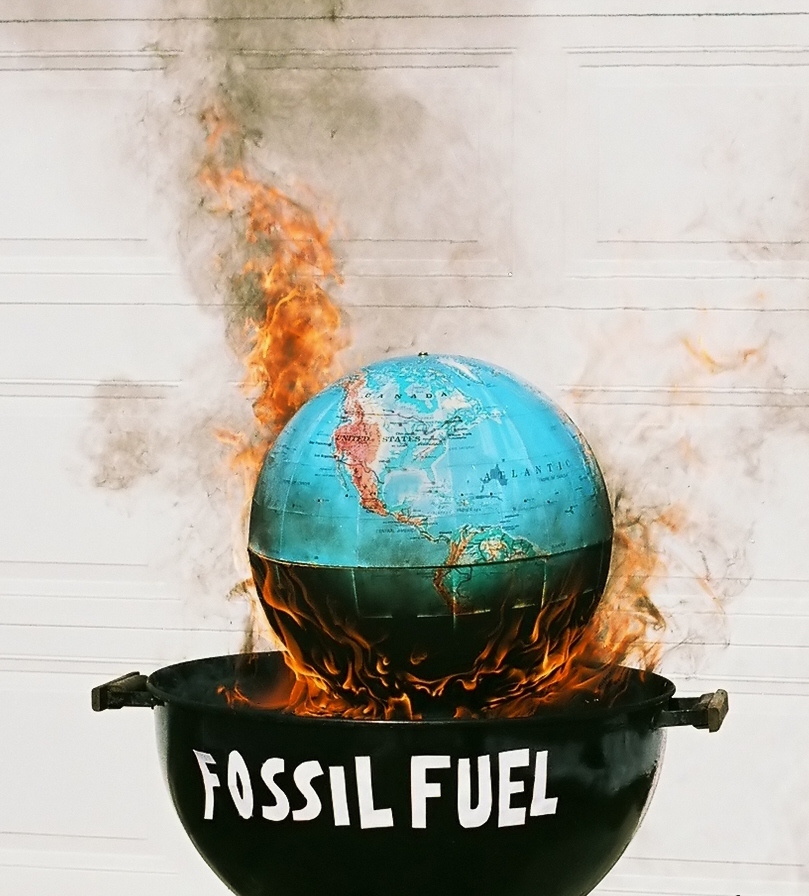
by Deep Green Resistance News Service | Mar 6, 2013 | Climate Change
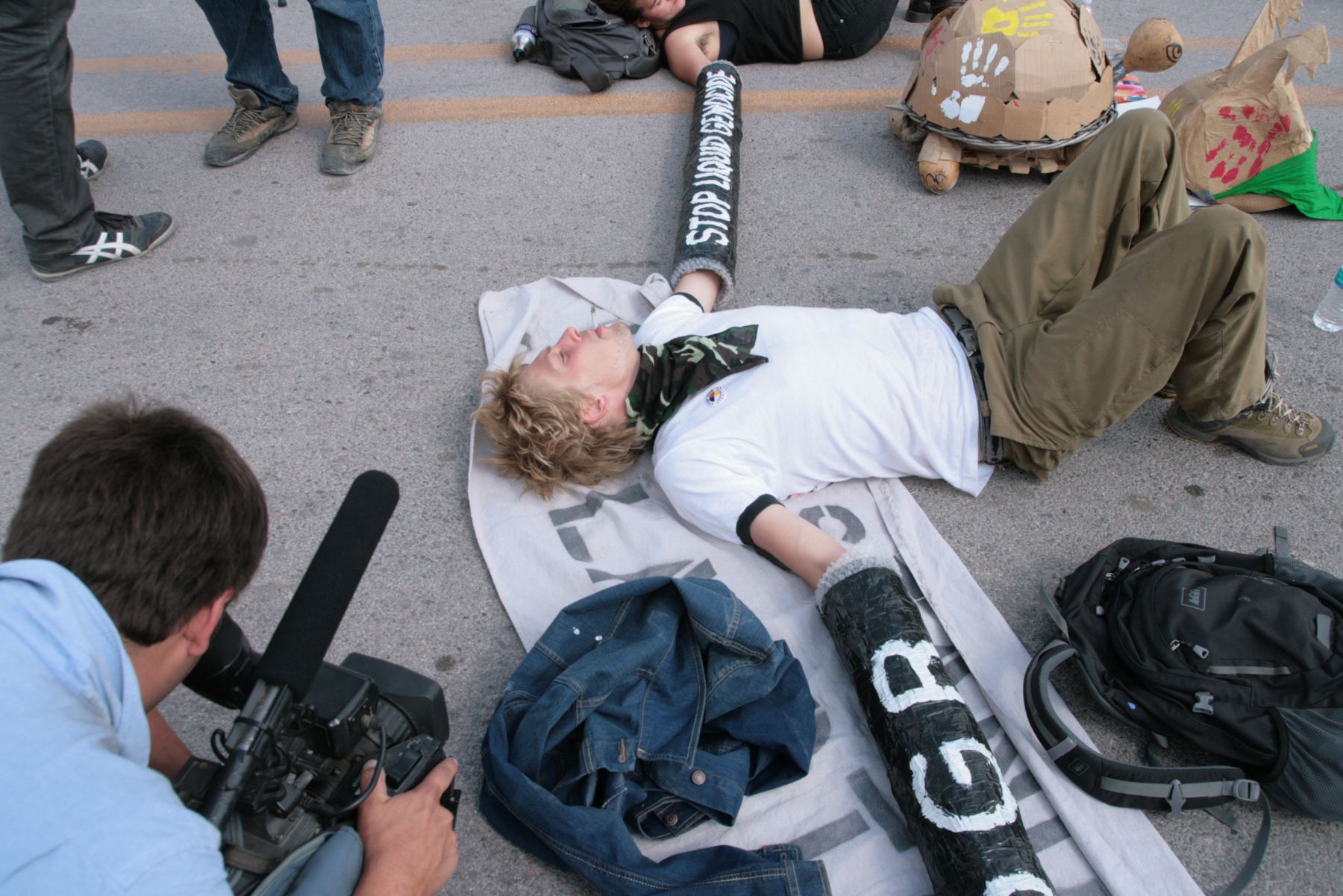

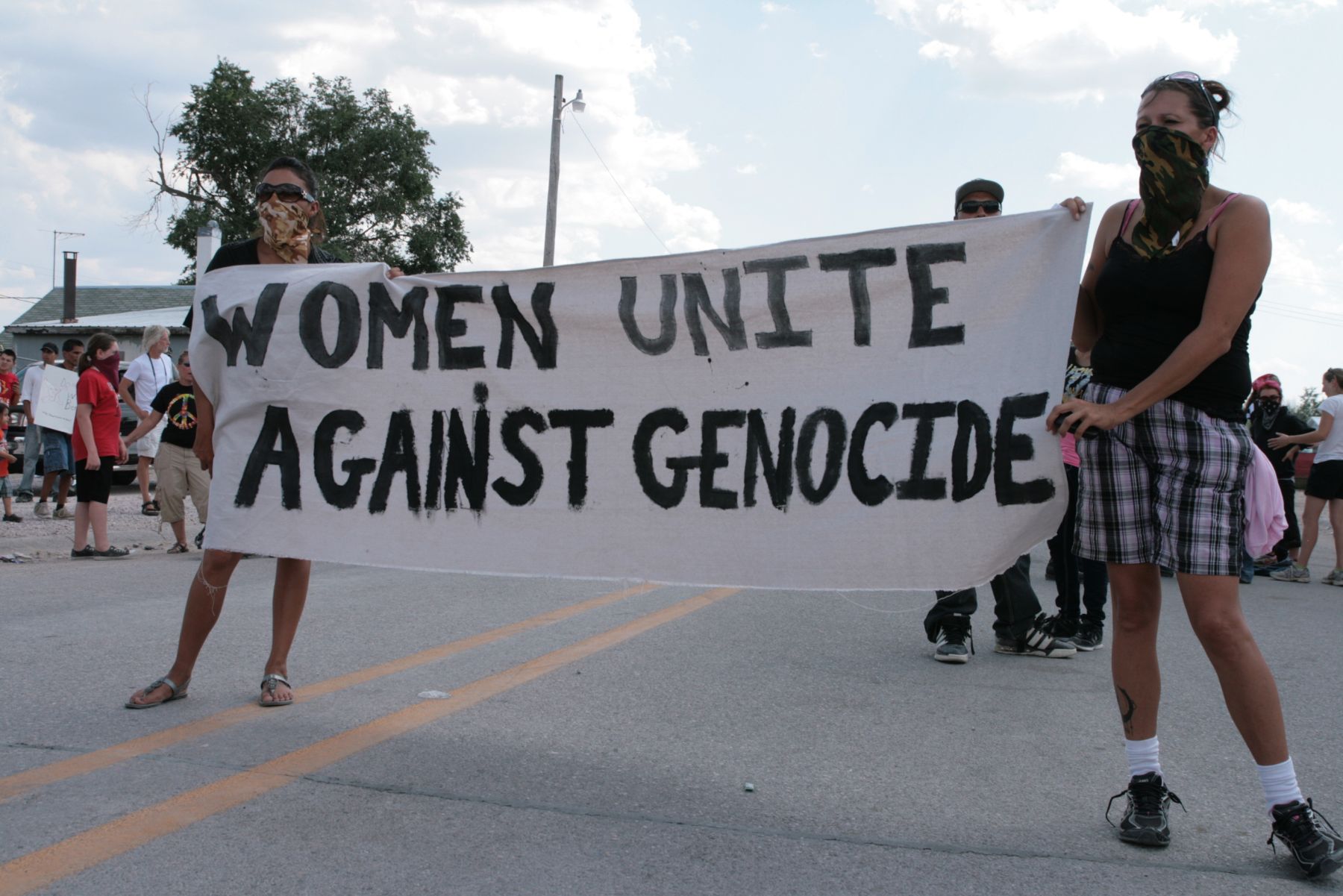
By Daniel Whittingstall / Deep Green Resistance Vancouver
The Situation and Our Options
Increased concentrations of atmospheric greenhouse gases (GHG), primarily carbon dioxide emitted from the burning of fossil fuels for cheap energy, have driven global average temperatures to rise. While this in itself is cause for concern, the real distressing predicament lies within the many positive feedbacks that are at or near their tipping points.
One major positive feedback is the arctic permafrost where large amounts of methane (a greenhouse gas) are stored underground. If the temperature continues to rise from the current 0.8C up to 1.5C above pre-industrial levels the permafrost will hit a tipping point and melt, releasing roughly 1,000 giga-tones of methane (which is 22 times more potent a greenhouse gas than C02 over a 100 yr. period, and 150 times more potent over a period of a couple years) into the atmosphere.
Since the global temperature is currently being raised due to Industrial Civilization’s increase of these GHG’s, and there is a time-lag between temperature rise and GHG levels (temperature catching up to where these gases have set the bar, roughly a 30 yr. time-lag), then all we need to do to find out how close we are to this tipping point is to look at current and historic levels of GHG’s and the correlating temperatures, right? Come walk with me for a moment.
Current C02 levels are at 395 ppm (C02 being the main factor in the last 180 yrs. of forcing temperature rise, most of which has increased in the past 30 yrs.). The last time C02 levels were this high was roughly 15 million years ago (mya), with temperatures roughly 3-6C above current levels (or 4-7C above pre-industrial times). It would be good to note here that projected emissions and C02 levels by 2030, if “business as usual” continues, will be around 516-774 ppm; levels closer to those of the Eocene 54-50 mya when temperatures were roughly 5-7C higher than today.
Since there is a time-lag between temperature rise and levels of C02 we can be certain that the temperature will rise 3-6C over the next 30 yrs. solely based on current levels of C02 alone. This of course would be the case without adding in any positive feedbacks like the melting of permafrost, arctic sea ice, ice caps, glaciers, ocean die offs due to acidification and rapid forest die offs due to drought/deforestation etc.
The thing is, the world has changed quite a bit in the last 15 myr. A lot more carbon, and other substances with the potential to turn into GHG’s, have been stored in the earths surface due to the resumption of glacial cycles (since 13 mya the earth has plummeted into glacial cycles-5 mya and rapid glacial cycles-2.5 mya), increasing the potential/possibility with which to warm the globe if they were ever to be fully released.
You see, the other tricky part about this time-lag is that if there was a huge spike in GHG’s over a shorter period of time, lets say 5-10 yrs. (which would definitely be the case if permafrost, ocean and forest die off positive feedbacks were to be pushed over their tipping points, thus releasing massive quantities of methane and C02), the global temperature rise would also increase at an exponential rate. Not to mention the fact that methane has a minute time-lag in comparison to C02.
So, a more realistic picture would be: current GHG levels will undeniably rise temperatures past the 1.5C mark in the next 10-15 yrs., pushing the permafrost over its tipping point and hurling it into a rapid positive feedback loop, drastically escalating the already exponential rate of global temperature rise. During (or even possibly before) this short process, every other positive feedback will come into play (this is because they are all just as sensitive to temperature and/or C02 increases as permafrost is) forcing the global temperature to rise beyond any conservatively or reasonably projected model.
What’s really concerning in all this is that the arctic sea ice, permafrost, glaciers and ice caps have already begun their near rapid melt, and we continue to increase our output of fossil fuel GHG emissions and deforest the earth. Does anyone know what more than a 5-7C temperature rise looks like? Near-term extinction for the majority of biological life, including humans. It means that almost all fresh and drinkable water will dry up. It means that the sea levels will rise by roughly 120 meters (394 ft). It means that the current levels of oxygen in the atmosphere right now will become so low that neither I nor you will be able to breath it. This is the part where most people start formulating rebuttals that usually include the word “alarmist!”. Well, if the bare facts of our current situation are not alarming then I would think we have an even bigger problem.
There are two distinct scenarios here that I feel need to be pointed out (most often they are not). The first one goes like this: if we keep destroying the Earth and continue down this path of “business as usual” then the biosphere will collapse and along with it the global economy and ultimately industrial civilization.
The other scenario goes like this: if the destruction perpetuated by industrial civilization is somehow halted, subsequently averting total biosphere collapse, then the global economy and industrial civilization will collapse.
Basically, in the next 10-15 yrs., it is unequivocal that either way the global economy and industrial civilization (all that we who are living within this structure know and rely on) will collapse.
Kind of makes the worry of a national economic recession seem like a bad joke. The question is then: which scenario would you prefer? The near extinction of all life on earth (including your own species), or the end of a really bad experiment in social organization that has almost, but not quite, destroyed the planet?
The only chance of survival is to immediately end the consumption of fossil fuels (on all levels and in every way, including well-intentioned “green-energy-solutions” that pump huge amounts of C02 into the atmosphere annually during set-up and production), and to quickly begin sequestering GHG’s from the atmosphere. Best way to end this consumption would be to shut down all fossil fuel extractions, and to lock up all ready-to-be-used fossil fuels: gasoline, coal, stored natural gas, and throw away the key. Best way to sequester the GHG’s (semi-naturally) would be to plant native-to-bioregional plants/trees wherever they had been destroyed, and to grow our own food locally in the parks, on roadways, on rooftops, and on the front/back lawns of every suburban home.
These are our only two options, and we need to do both at the same time. Realistically this means we will need to bring down atmospheric C02 levels to where they were in pre-industrial times. In order to have any certainty of success we must be 50% of the way there by about 2016, and 100% there by 2020.
Yes, things look bad. But it all depends on your perspective. One good thing is that civilization does not represent the whole of humanity, nor does it represent any other species of life on earth. So, on the one hand it doesn’t look too good for civilization if people decide to rise up and end this insanity (which would subsequently be a positive effect on the biosphere and the rest of humanity). But, on the other hand, well…not so good for anyone.
Nevertheless be encouraged, we still have a small window of time in which to succeed!
Overview of Data
Below are dates with projected increases of both C02 and global temperature, along with projected tipping points for major positive feedback loops around the world.
Reasonable Estimation of Temperature Correlation With C02 Levels
These calculations are based only on current levels of C02 and historic corresponding
temperature level values, no future increase of C02, no current or future positive feedbacks.
Current level of C02 395 ppm = 4.5C increase above current temp, average between 3-6C
(2013, 0.8C).
35 year time-lag = 2048 at 4.5C increase
Estimates For C02 Increase
C02 ppm increase at current rate, five year increments
| 2013 |
2018 |
2023 |
2028 |
2033 |
2038 |
2043 |
| 395 |
405 |
415 |
425 |
435 |
445 |
455 |
C02 ppm increase at current rate with increase of fossil fuel consumption and positive feedbacks
| 2013 |
2018 |
2023 |
2028 |
2033 |
2038 |
2043 |
| 395 |
415 |
435 |
455 |
495 |
535 |
575 |
Estimates For Temperature Increase
Temperature based on current trends over past 20 years (without further inputs)
| 2013 |
2020 |
2030 |
2040 |
2050 |
2060 |
| 0.80 |
0.90 |
1.05 |
1.20 |
1.35 |
1.50 |
Temperature increase based on C02 correlation/35 year time lag
| 2013 |
2018 |
2023 |
2028 |
2033 |
2038 |
2043 |
2048 |
| 0.80 |
1.33 |
1.86 |
2.39 |
2.92 |
3.45 |
3.98 |
4.51 |
Temperature increase based on C02 correlation and forcing from positive feedbacks
| 2013 |
2018 |
2023 |
2028 |
2033 |
2038 |
2043 |
2048 |
| 0.80 |
1.45 |
2.23 |
3.04 |
4.06 |
4.88 |
5.90 |
6.90 |
Note:
2050 Conservative estimates based on current trends for major tipping points
2018 Reasonable estimates based on C02 and positive feedbacks for major tipping points
2034 Average between both estimates for major tipping points
Individual Tipping Points for Positive Feedbacks
2016 1.11C increase -Arctic sea ice tipping point (warmer oceans)
2018 1.33C increase -Arctic clathrate tipping point (methane release)
2019 1.43C increase -Greenland and Antarctic ice sheet tipping points (sea level rise)
2020 1.54C increase -Permafrost tipping point (methane release)
2028 455ppm C02 -Ocean acidification tipping point (C02 release) 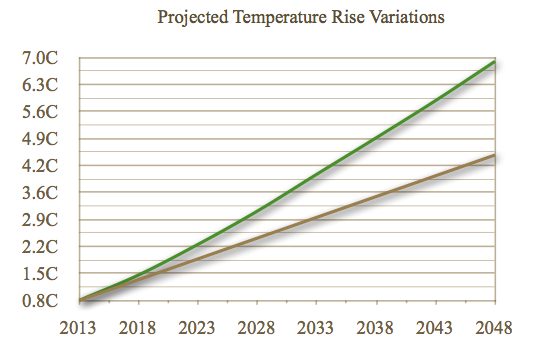
Fig. 1. This shows the variations between projected increases in temperature: bottom line (brown) represents the rate of temperature increase based on the C02 correlation with a 35 year time lag, and top line (green) represents the temperature increase with C02 correlation including forcing from positive feedbacks.
Overview of Concepts in Climate Change
Carbon Dioxide
Carbon dioxide (CO2) is a naturally occurring chemical compound and is a gas at standard temperature/pressure. CO2 exists in Earth’s atmosphere as part of the carbon cycle, emitted through plant and animal respiration, fermentation of liquids, volcanic eruptions as well as various other means. Levels of CO2 concentrations have risen and fallen over the past 3 billion years but with striking clockwork over the last 800 thousand years, rising and falling on a cycle of 40-100 thousand years (Fig. 2).
Ice core data indicate that CO2 levels varied within a range of 180 to 300 ppm over the last 650 thousand years (Solomon et al. 2007; Petit et al. 1999), corresponding with fluctuations from glacial and interglacial periods, with the last interglacial period nearing levels of 290 ppm (Fischer et al., 1999).
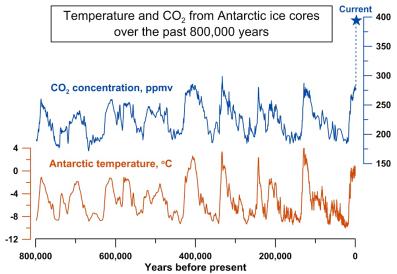
Fig. 2. This is a record of atmospheric CO2 levels over the last 800,000 years from Antarctic ice cores (blue line), and a reconstruction of temperature based on hydrogen isotopes found in the ice (orange line). Concentrations of CO2 in 2012, at 392 parts per million (ppm), from the Mauna Loa Observatory are shown by the blue star at the top (Simple Climate, 2012. Credit to: Jeremy Shakun/Harvard University). https://simpleclimate.wordpress.com/2012/04/04/global-view-answers-ice-age-co2-puzzle/
Near the end of the Last Glacial period, around 13,000 years ago, CO2 levels rose from about 180 ppm to about 260 ppm and leveled off until the Industrial Revolution in the mid 1700’s when it began to climb from 280 ppm (Neftel et al. 1985). While that 260 ppm of CO2 had remained more or less unchanged for the last 10,000 years, roughly since early Civilization, it was the actions of Civilization through the burning of fossil fuels, since the Industrial Revolution, that caused a dramatic increase over the last century (Blunden et al. 2012, S130).
The contribution of Industrial Civilization’s CO2 comes mainly from the combustion of fossil fuels in cars, factories and from the production of electricity and deforestation for timber and agricultural lands. Today the monthly mean concentration levels, (Fig. 3), are around 394 ppm (Recent CO2 readings for 2012 at the Mauna Loa Observatory by the National Oceanic & Atmospheric Administration), increasing about 100 ppm from pre-industrial times in just the last 100 years and currently rising at a rate of 2 ppm each year.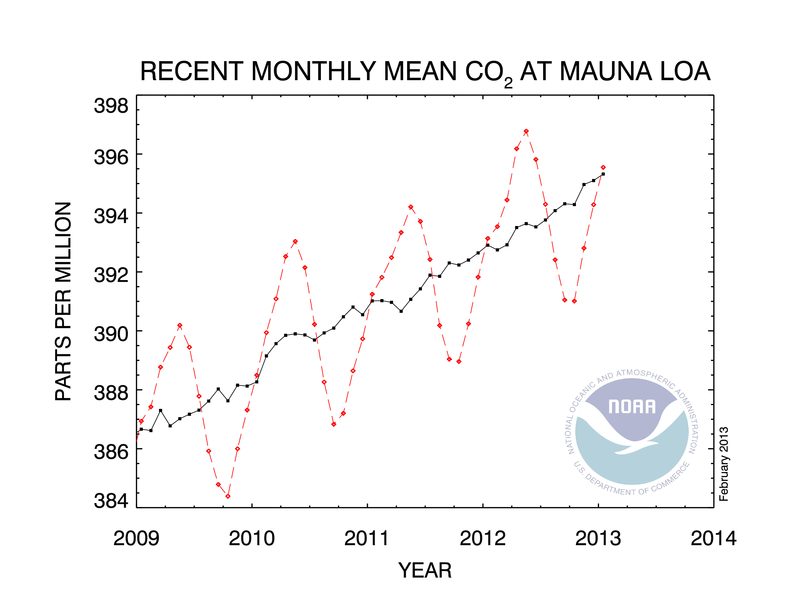
Fig. 3. This table shows monthly mean CO2 measurements for the years 2008 to 2012 from the Mauna Loa Observatory, Hawaii. The dashed red line represents monthly mean values, and the black line is representative of monthly mean values with the correction for average seasonal cycles (NOAA Earth System Research Laboratory, 2012). http://www.esrl.noaa.gov/gmd/ccgg/trends/#mlo_full
Carbon dioxide has a long lifespan once emitted into the atmosphere. “About half of a CO2 pulse to the atmosphere is removed over a time scale of 30 years; a further 30% is removed within a few centuries; and the remaining 20% will typically stay in the atmosphere for many thousands of years.” (Solomon et al. 2007).
Therefore, the amount of CO2 currently in the atmosphere will possibly be persisting long enough to mingle with future emissions that are projected to be higher. Based on CO2 emissions from burning fossil fuels in the year 2000, the IPCC calculated out the possible future increase of emissions if Civilization continued at that current rate of economic and consumer growth (increased fossil fuel consumption). “The projected emissions of energy-related CO2 in 2030 are 40–110 % higher than in 2000” (Solomon et al. 2007).
This could result in an increase of atmospheric CO2 from levels that were 369 ppm at the time, to 516-774 ppm by 2030 (Fig. 4); levels closer to those of the Eocene, 700-900 ppm roughly 54-50 million years ago (Paul N. Pearson 2000), when temperatures were about 5-7 degrees Celsius warmer than today and sea levels were roughly 120 m higher (Sluijs et al. 2008).
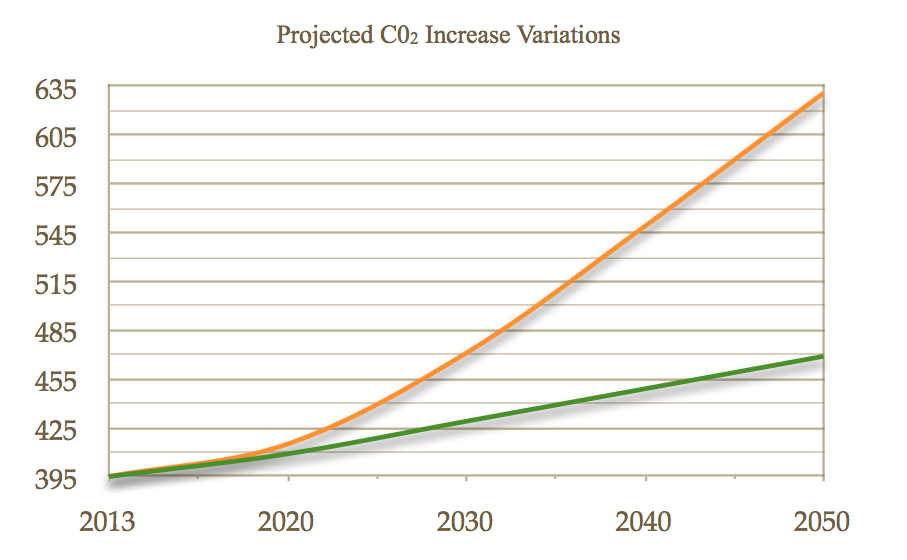
Fig. 4. This table shows the variations between projected C02 increases: bottom line (green) is the current rate of increase at 2ppm/yr. based on previous ten year average, top line (orange) is current rate plus increased Industrial Civilization forcing and positive feedbacks.
Greenhouse Earth
The environmental effects of carbon dioxide are of significant interest. Earth is suitable for life due to its atmosphere that works like a greenhouse. A fairly constant amount of sunlight strikes the planet with roughly 30 percent being reflected away by clouds and ice/snow cover, leaving the uncovered continents, oceans and atmosphere to absorb the remaining 70 percent. Similar to a thermostat, this global control system is set by the amount of solar energy retained by Earth’s atmosphere, allowing enough sunlight to be absorbed by land and water and transforming it into heat, which is then released from the planet’s surface and back into the air as infrared radiation.
Just as in the glass ceiling and walls of a greenhouse, atmospheric gasses, most importantly carbon dioxide, water vapor and methane, trap a fair amount of this released heat in the lower atmosphere then return some of it to the surface. This allows a relatively warm climate where plants, animals and other organisms can exist. Without this natural process the average global temperature would be around -18 degrees Celsius; see more (Solomon et al. 2007).
The current levels of greenhouse gas (GHG) concentrations, principally carbon dioxide (Fig. 3), in the Earth’s atmosphere today are higher and have the potential to trap far more radiative heat than has been experienced within the last 15 million years (Tripati 2009), amplifying the greenhouse effect and raising temperatures worldwide. “The total CO2 equivalent (CO2-eq) concentration of all long-lived GHG’s is currently estimated to be about 455 ppm CO2-eq” (Solomon et al. 2007), as of 2005. These other contributors of GHG’s include methane released from landfills, agriculture (especially from the digestive systems of grazing animals), nitrous oxide from fertilizers, gases used for refrigeration and industrial processes, the loss of forests that would otherwise store CO2, and from the melting of permafrost in the arctic.
According to the IPCC Fourth Assessment Report “These gases accumulate in the atmosphere, causing concentrations to increase with time. Significant increases in all of these gases have occurred in the industrial era”, and the increases have all been attributed to Industrial Civilization’s activities (Solomon et al. 2007).
Historically, through the rise and fall of temperatures over the last 800 thousand years, temperatures have risen first, then CO2 would increase, accelerating even more temperature rise until a maximum when both would then drop, creating a glacial period. Though CO2 levels over this period of time have not been the trigger for temperature rise and interglacial periods, they either have occurred at the same time or have led positive feedback global warming during the stages of deglaciation, greatly amplifying climate variations and increasing the global warming capacity due to the greenhouse effect (Shakun et al. 2012), (Solomon et al. 2007).
What makes the present situation unpredictable to some extent is that never before has CO2 climbed so rapidly and so high, far ahead of temperature. Furthermore, this extra heat-trapping gas released into the atmosphere takes time to build up to its full effect, this is due to the delaying effect of the oceans as they catch up with the temperature of the atmosphere; deep bodies of water take longer to warm. There is a twenty-five to thirty-five year time lag between CO2 being released into the atmosphere and its full heat-increasing potential taking effect.
This means that most of the increase of global temperature rise observed thus far has not been caused by current levels of carbon dioxide but by levels that already have been in the atmosphere before the 1980’s. What is troublesome here is that these last three decades since then have seen the levels of greenhouse gases increase dramatically. On top of the current temperature rise we see now there is already
roughly another thirty years of accelerated warming built into the climate system.
There are many other Civilizational factors that contribute to this global rise in temperature outside of GHG’s. While these extra factors do supply further warming and are just as serious a threat to a semi-stable climate, they are not as long lasting.
One of the most notable of these, being the second largest Civilizational contributor to global temperature rise, is black carbon (BC), also called soot (T. C. Bond et al 2013). The greatest sources of BC are the incomplete burning of biomass (forest and savanna burning for agricultural expansion) and unfiltered diesel exhaust for transportation and industrial uses (Ramanathan and Carmichael 2008). There is a two fold warming effect from the BC.
First, the dark particles of this soot absorb incoming heat from solar radiation and directly heat the surrounding air, though only for a short period of time. Secondly, the soot particles in the air, once carried from their point of origin, are increasingly falling on snow and ice changing these reflective surfaces into absorptive ones, decreasing the albedo (reflectivity). Therefore, BC deposits have increased the melting rate of snow and ice.The most alarming of these effects can be seen on glaciers, ice sheets and the arctic sea ice (T. C. Bond et al 2013). While reductions in BC would have immediate but not long lasting effects on temperature rise, it would increase the chances of averting further warming
Nevertheless, the projected rise due to the continued increase in levels of GHG’s will not be prevented without
reducing overall emissions.
Temperature
The Earth is warming and this time the trend is far from natural. The average temperature of the Earth’s surface has risen by 0.8 degrees Celsius since the late 1800s (Fig. 4). On a geologic timescale this swift increase is alarming. When temperatures have risen in the past, warming the planet at several points between ice ages, the average length of time this process has taken is roughly 5,000 years to increase global temperatures by 5 degrees.
In this past century alone the temperature has risen ten times the average rate of ice age recovery warming, a recent trend not only driven by the rise of atmospheric CO2 concentrations, but also amplified by them.

Fig. 4. This table shows global temperature anomaly from 1880 through to 2011. Black lines are representative of annual mean variances and the red line is representative of five year running temperature mean’s. (NASA Goddard Institute for Space Studies, 2012) http://data.giss.nasa.gov/gistemp/2011/Fig2.gif
Continued economic, global population and energy consumption growth over the next few decades will consequently increase not only CO2 emissions, but also the rate and quantity with which they accumulate in the atmosphere. This is a business-as-usual scenario where efforts to reduce greenhouse gas emissions, namely CO2, have fallen short of any earnest mitigation, “locking in climate change at a scale that would profoundly and adversely affect all of human Civilization and all of the world’s major ecosystems” (Allison et al. 2009); see scenario A1FI (Fig. 5).
Even if the global mean temperature only rises another 2 degrees before the end of this century, it would be a larger increase in temperature rise than any century-long trend in the last 10,000 years. A one degree global temperature rise is also significant for the reason that it takes a vast amount of heat to warm all the oceans, atmosphere, and land by that much; even more so is the significance of subsequent ecosystem collapse in climate sensitive areas such as the Arctic due to such a rise.

Fig. 5. This is a reconstruction of global average temperatures relative to 1800-1900 (blue), observed global average temperatures since 1880 to 2000 (black), and projected global average temperatures out to 2100 within three scenarios (green, yellow and red), (Allison et al. 2009). Scenario A1FI, adopted from the IPCC AR4 2007 report, represents projections for a continued global economic growth trend, and a continued aggressive exploitation of fossil fuels; the FI stands for “fossil fuel intensive”. http://www.ccrc.unsw.edu.au/Copenhagen/Copenhagen_Diagnosis_HIGH.pdf
Arctic Warming
The greatest changes in temperature over the last hundred years has been in the northern hemisphere, where they have risen 0.5 degrees Celsius higher since 1880 than in the southern hemisphere (Fig. 6). The Arctic is experiencing the fastest rate of warming as its reflective covering of ice and snow shrinks and even more in sensitive polar regions.
One of the main facets that are being affected by the increase of temperature in the Arctic is the potential collapse of Arctic ecosystems that succeed in the region. Ecosystems that are under pressure and that are at their tipping points can be defined as having their thresholds forced beyond what they can cope with. Different components of ecosystems experience diverse changes. In this instance,
“ecosystem tipping features” refers to the components of the ecosystem that show critical transitions when experiencing abrupt change (Duarte et al. 2012).
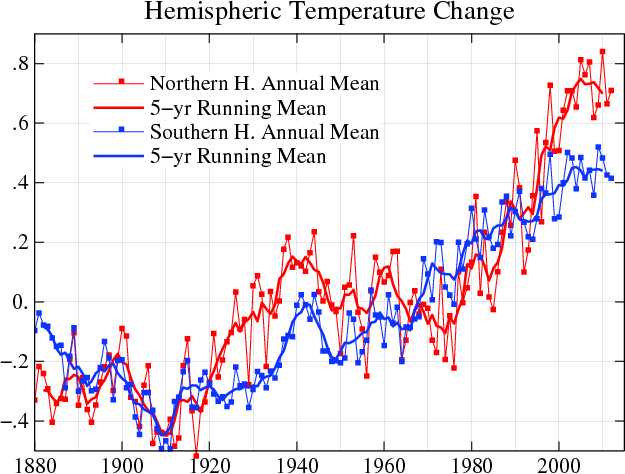
Fig. 6. This table shows both annual and five year mean temperature variances between 1880 and 2011. Temperature mean averages for the northern hemisphere are in red and southern hemisphere averages are in blue (NASA Goddard Institute for Space Studies, 2012). http://data.giss.nasa.gov/gistemp/graphs_v3/Fig.A3.gif
Sea Ice Loss
The significance of sea ice loss in the Arctic relates to a serious tipping point in the Arctic marine ecosystem which is given by the temperature at which water changes state from solid to liquid. Ice responds suddenly to changes at this temperature. This causes warming and loss of sea ice to amplify the potential changes to the climate including a reduction in albedo with the declining sea ice. Crossing the tipping point sets in motion many changes that further increases temperature in the Arctic region on top of current global warming (Duarte et al. 2012).
The ice that encompasses the Arctic has slowly been dwindling ever since a catastrophic collapse in the Arctic region in 2007. Since that point, close to two thirds of the ice has vanished compared to a decade earlier when the loss of sea ice was significantly smaller (Anderson, 2009). Scientists had previously predicted that the ice in the Arctic region would not be reduced to the point that it reached in 2007 until at least 2050, and in 2012 it dropped to levels much lower than in 2007 (Fig. 7). It is now predicted that the Arctic summer ice could disappear entirely as early as 2013.
The vulnerable setting of the Arctic region has certainly made it easy for global warming to have significant influences on the natural climate processes. The white ice naturally reflects sunlight back into space, but with the melting of the ice and subsequent open, dark sea water, the reflectivity is reduced and therefore the heat is retained instead. The arctic seas warm up, melting more ice, and then even more is absorbed and melted by the increasing water temperature change. This creates a dangerous feedback loop that intensifies melting and overall temperatures.
Observations and climate models are in agreement that through the 21st century, Arctic sea ice extent will continue to decline in response to fossil fuels being burnt and greenhouse gases being released into the atmosphere. Through the influxes of heat being circulated, temperature for the terrestrial and aquatic systems continues to increase, delaying ice growth during winter and autumn only to increase the temperature on the region.
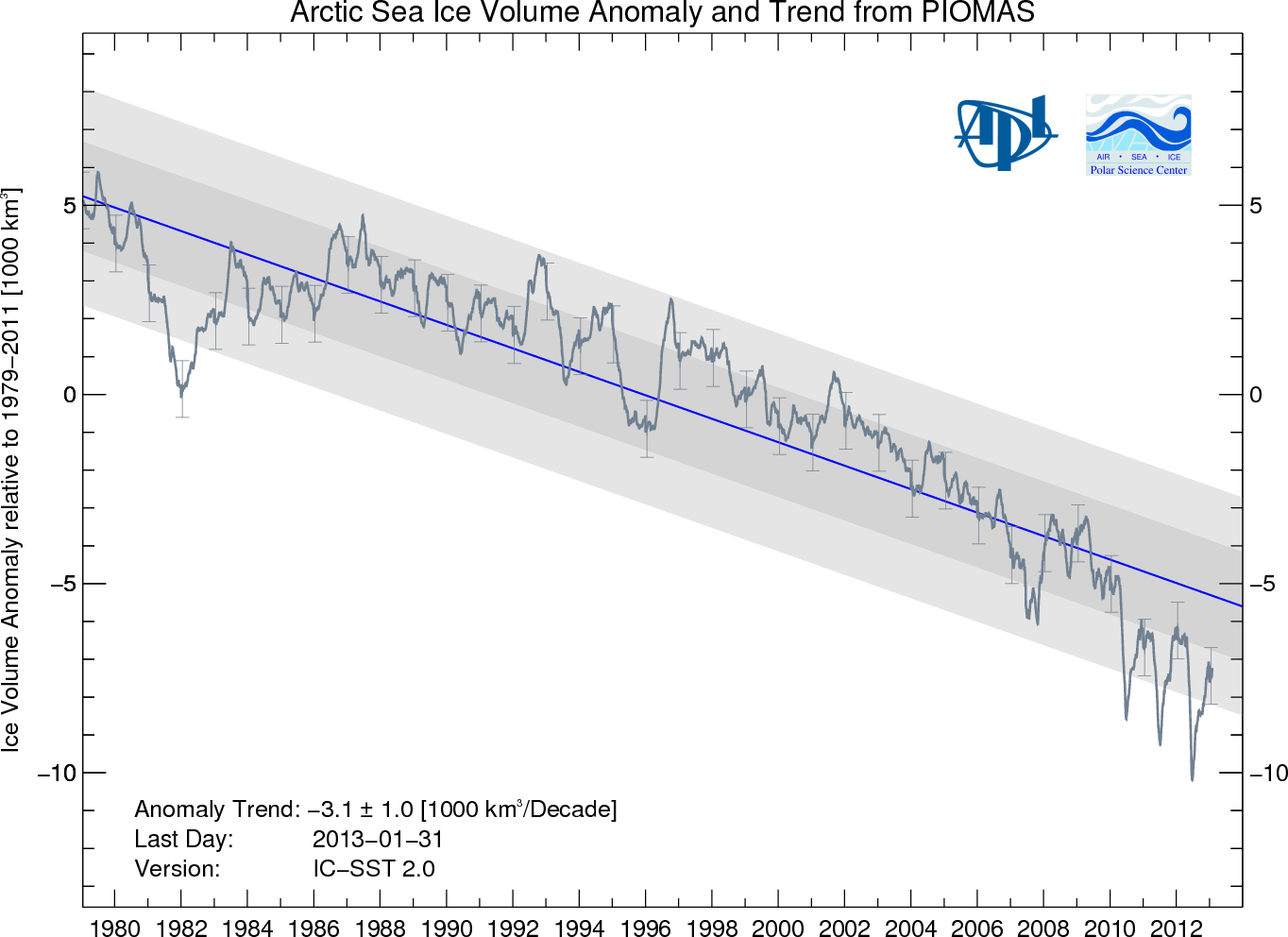
Fig. 7. This table shows the ice volume anomalies of the Arctic ocean, with respect to the volume of ice over a period between 1979 to 2011. (Polar Science Center, psc.apl.washington.edu. 2011) http://psc.apl.washington.edu/wordpress/wp-content/uploads/schweiger/ice_volume/BPIOMASIceVolumeAnomalyCurrentV2.png?%3C%3Fphp+echo+time%28%29
Permafrost Melt
One of the most worrisome scenarios of a positive feedback is the thawing of huge quantities of organic material locked in frozen soil beneath Arctic landscapes. Vast quantities of carbon and methane from once rotting vegetation are stored in the frozen soil. This frozen soil is called permafrost and it contains significantly more carbon than is currently in the atmosphere.
Permafrost is defined as subsurface Earth materials remaining below 0°C for two consecutive years. It is thoroughly widespread in the Northern Hemisphere where permafrost regions occupy 22% of the land surface (Schuur et al. 2008).
The temperature, thickness and geographic continuity of permafrost are controlled by the surface energy balance. Permafrost thickness geographically ranges from 1 meter to 1450 meters depending on where the permafrost is situated. The layer that thaws in the summer and refreezes in the winter is referred to as the active layer. The thickness of the active layer ranges between 10 centimeters and 2 meters. Beneath the active layer is the transition zone, the buffer between the active layer and the more stable permafrost. The thickness of the active layer is significant because it influences plant rooting depth, hydrological processes, and the quantity of organic soil matter uncovered to the above-freezing seasonal temperatures. The growing concern is that permafrost’s relationship with the Arctic warming could lead to drastic changes for the region.
The processes that involve the transfer of stored carbon into the atmosphere have the potential to significantly increase climate warming in the Arctic region (Schuur et al. 2008). Since it only would take a few more degrees in temperature rise to tip the permafrost into rapid thawing and subsequently release huge amounts of stored carbon and methane, methane being over 20x as potent a greenhouse gas, this would result in a much larger feedback into the global GHG level rise.
A Warmer World
Industrial Civilization is on a path to heat the Earth up by 4 to 7 degrees Celsius before the middle of this century if it fails to end its carbon emissions, triggering a cascade of cataclysmic changes that will include the increase of extreme heat-waves, prolonged droughts, intensified weather patterns, the total loss of Arctic sea ice, rapid decline in global food availability, sea level rise affecting billions of people, and eventually an abrupt extinction of the majority of biological life on earth.
The solution, while not a simple one to execute, is clear: Industrial Civilization must end its reliance on fossil fuels and begin to sequester CO2 from the atmosphere immediately, reducing the atmospheric concentration of CO2 down to a safe level.
A full reference list for this article is available here: http://dgrnewsservice.org/newsservice/2013/03/reference-material1.pdf
